#hylas and the water nymphs
Text
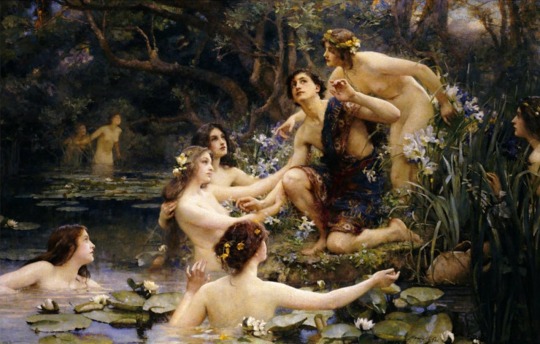
Hylas and the Water Nymphs (c.1909, oil on canvas) | Henrietta Rae
#art#fine art#painting#oil painting#20th century#hylas and the water nymphs#henrietta rae#mythological painting
69 notes
·
View notes
Text
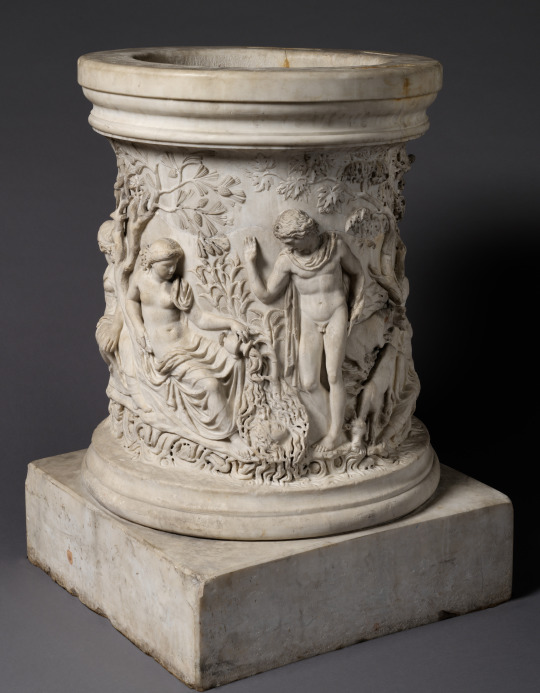
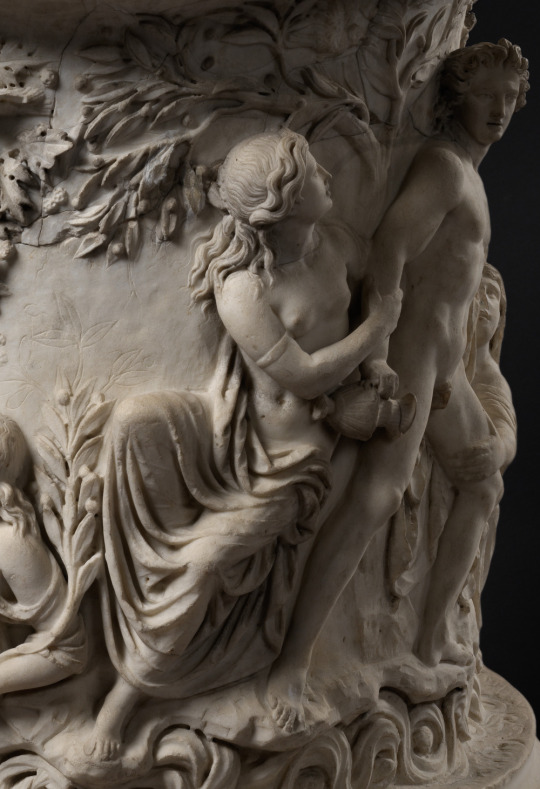
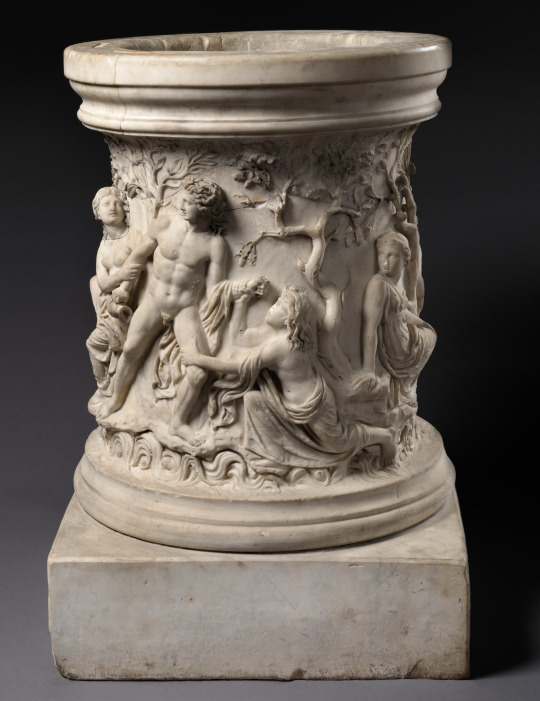
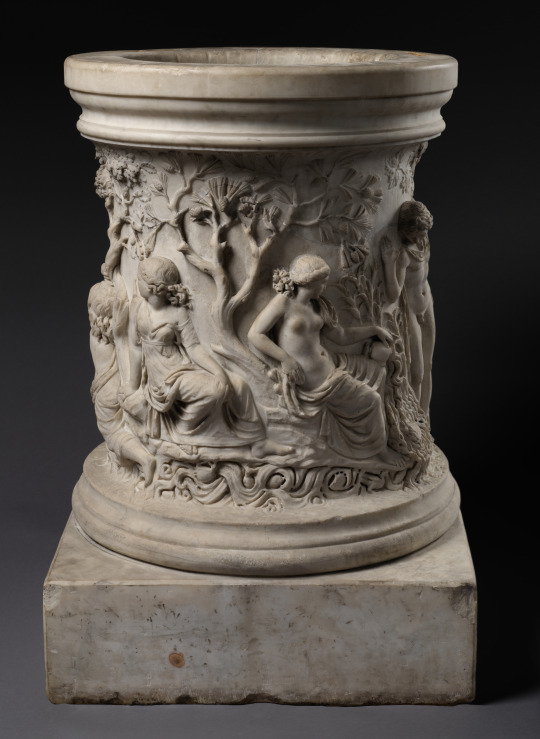
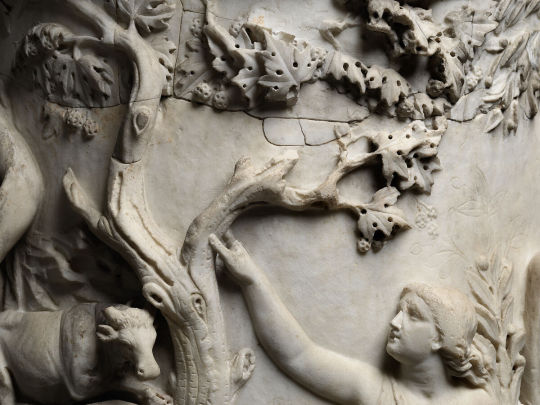
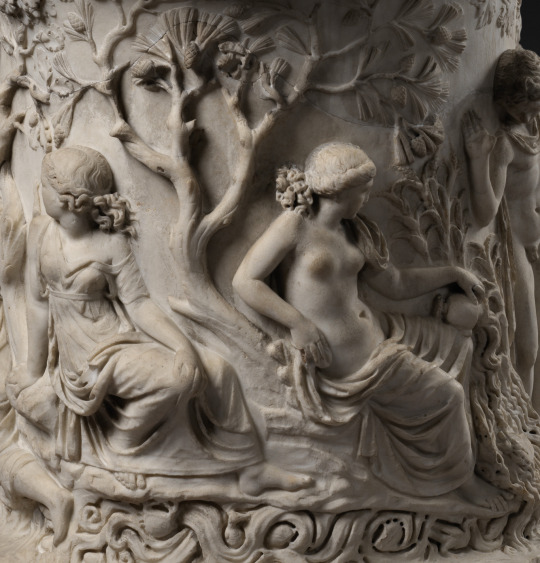
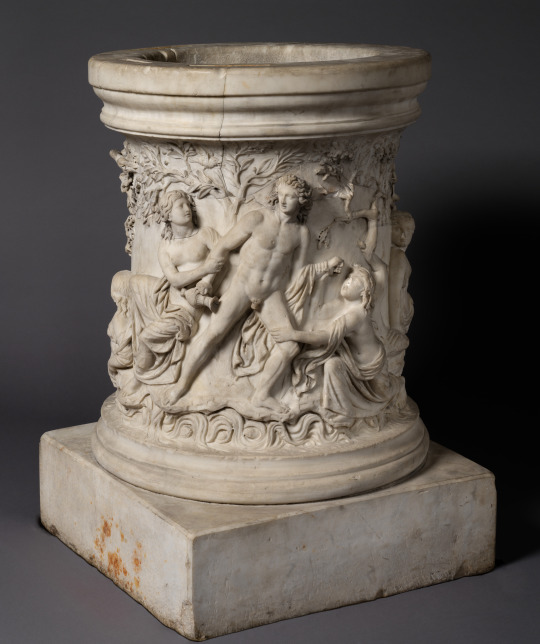
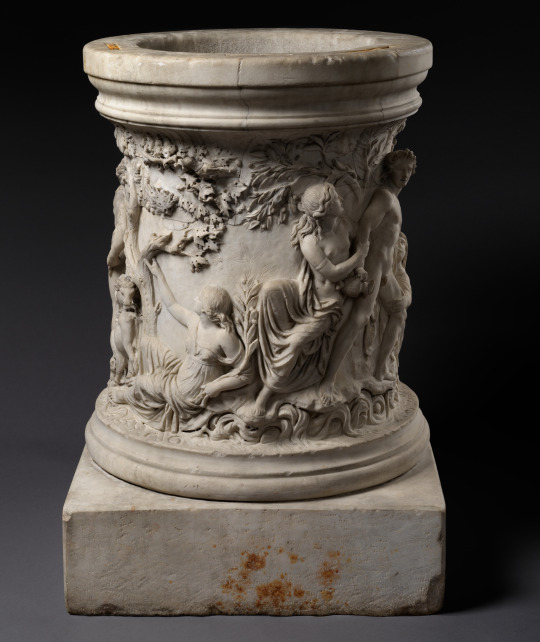
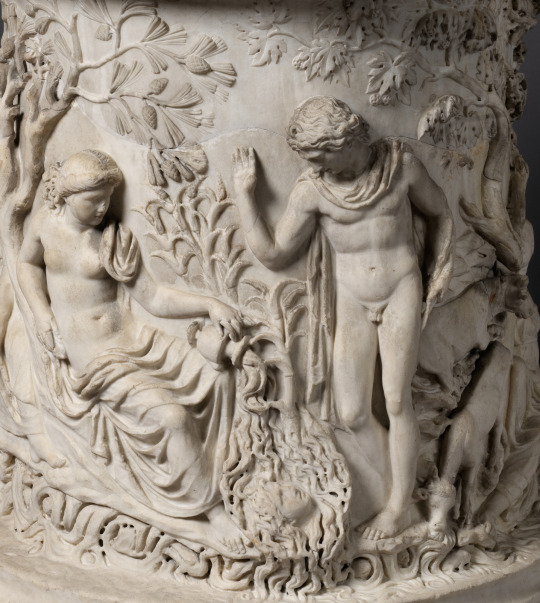
Roman Puteal (wellhead) 2nd century.
This puteal (wellhead) is an outstanding example of Roman figural relief sculpture of the second century A.D. It once covered a well in Ostia, the port town of ancient Rome, probably within a sumptuous Roman villa along the Tiber River. The ancient Roman sculptor has transformed a utilitarian object into a luxurious work of art. Carved from a single block of marble, whose form resembles a Hellenistic altar, the drum is decorated with two cautionary tales from Greek mythology that relate to water. The sculptor seamlessly combined the story of Narcissus and Echo, best known from Ovid’s Metamorphoses, with the tale of the handsome hero Hylas being abducted by nymphs in the land of Mysia (western Turkey) as he was fetching water for the Argonauts on their quest to find the Golden Fleece, best known in Greek literature from the Argonautica of Apollonios of Rhodes.
The Metropolitan Museum of Art. NYC (USA) Public Domain pictures.
791 notes
·
View notes
Text
Worship
Human!Giyuu x AFAB!Naiad!Reader

Content Warnings: MDNI, sub!Giyuu, dom!reader, penetrative sex (f! receiving), unprotected sex, oral sex (f! receiving), face-sitting (f! receiving), pegging (not strap-on, Giyuu gets fucked with a dildo though), body worship, having sex underwater, virginity loss (Giyuu is a virgin), creamp!e, praise k!nk, worship k!nk, temperature play (ice), slight degradation from reader, reader refers to Giyuu as “pet” a few times, please lmk if I missed anything!!
Summary: As a water nymph, you never saw the world from beyond the spring you were born from, having only seen humans come to your spring bearing gifts and performing rituals for the sake of worship. However, one day, a beautiful human male stumbled his way into the domain of your sacred spring, and with neither offering nor sacrifice to give you, he thought of another way in which he could pay you worship.
Word Count: ~3.6k
Divider Credit: @/benkeibear
A/N: this was inspired from the story of Hylas and the Water Nymphs, a Greek mythology story where Hylas, a young male, goes to get water from a spring but is kidnapped by the Naiads because of how beautiful he was, it’s a short but interesting read!



Beauty was beheld by those who wished to seek it.
It would be bestowed upon in many different forms, through life, through fertility, and through healing.
Oftentimes, those who sought such beauty would do so through sacrifice – and would give thanks through continued worship of those who so graciously imparted such virtues upon the needy.
As the sun would rise, your eyes bore witness to such worship, as humans from the nearby village would arrive – men, women and children all wishing for their lives to be filled with beauty unknown. Some would ask for it on behalf of others, a sick family member perhaps – or possibly for the good of their village, praying for the blessing of a good harvest with the changing of seasons; others would ask for their own sake, for personal gain and fulfillment. And you were willing to provide them with what they desired, so long as they gave appreciation and thanks in return.
When dawn broke over the horizon, a line of villagers would emerge from the woods, the men carrying the corpses of swine or lambs for the sake of sacrifice. You would peer at them from within your quiet spring, eyes just above the surface of the water as they’d form a circle and remove the bones from the animal and offer them at the edge of the spring.
Smiling, you’d emerge from the water and would take the bones into your possession, admiring the beauty in the humans’ effort to worship you. As you stood collecting the bones, some of the children would come by and offer locks of their hair to you – curious and excited to see such a pretty being emerge from the spring. You’d take their offerings and gently pat them on the head, before using water to create doll-like figures made out of ice as the children stared in awe at your power. Giggling, they’d take the shaped ice into their soft hands and run back to their mothers, showing them what the “beautiful water fairy” gifted them before it slowly melted away in their hold.
The villagers would cook and feast upon the meat that was not sacrificed until the sun rose higher into the sky, chatting amongst themselves, happiness evident in their eyes as they’d return to the village to find their crops thriving and their sick healing.
It was good.
It was beautiful.
And so you’d return to your spring, with water as calm as night and falls as enchanting as the morning mist, cascading into the place that inhabited your very soul. You submerged into its depths, ripples causing floating lily pads to drift away from you before swimming behind the falls, your home behind its veiled entrance.
Each week, the same ritual would take place – the villagers would change over the years, some growing old and some with newer faces. You’d always laugh at those who’d blush and refuse to make eye contact with you due to your lack of clothing – something unnecessary for a water nymph such as yourself – but the unmistakable happiness remained constant throughout their years of worshiping you.
However, on a day in which the villagers would usually not come to your spring with plans of worship, you heard the trudge of footsteps from outside of your home. Curious, as it sounded like a single human had come to your spring rather than a group, you’d wondered if there had been some sort of emergency that required your help.
Perhaps the human was in need of healing? Or caring for someone who was dying? So you emerged from behind the waterfall, only to find a young man – no older than his early twenties you’d assumed, as you’d learned of the average human lifespan from blessing generations upon generations of villagers over the years. His raven locks splayed past his shoulders and fell down his back and chest – which was completely bare down until his waist, where the only cloth he wore seemed to be his woolen chiton which had fallen off of his wide shoulders and pooled past his hips, revealing a physique that would invoke the envy of Heracles himself.
He crouched down at your spring, filling his hydria with the sacred water of your home.
“May I ask why you fill your cup with the water of this spring?” you asked, looking at him with curiosity. Startled, he stood up, spilling the water that he had collected in the process.
“This water is not meant for your consumption, love. I must ask that you refrain from drinking it at all,” you continued, a soft smile gracing your features.
“Who are you?” the man asked.
How rude, you thought, taking from your home and not knowing who you were.
“I am the spirit which inhabits this spring, dear human. May I ask what you are doing alone and so far from your village? I’m afraid I have not seen your face before.” You walked along the water’s surface, ripples emanating from your footsteps as you closed the distance between you and the stranger. This man, however, did not seem to like that idea – pulling out a xiphos blade from the scabbard hooked to his waist belt to point it towards you in warning.
“Do not come near,” he demanded, a certain venom lacing his tongue, although a faint blush seemed to grace his cheeks as it took everything within him to not look below your shoulders.
“Such weapons are useless against me, love – I’d have hoped that your kind would be smarter than to show hostility to a being like myself,” you sighed, continuing to draw near. “I assume you did not come for the sake of worship, then, given your confusion?”
He glared, yet said nothing, instead deciding to sheath his blade – expression nearly unreadable as you tentatively approached him.
“Why would I waste my time by spending it on worship? I’m collecting water for my group.”
“So there are more of you? I don’t sense them, could they have left you behind?” You looked over his shoulder before gazing at him again. His eyes narrow, his jaw clenching before looking back over his shoulder, searching for someone who wasn’t there.
“Doesn’t matter. I’m thirsty, so I’ll be taking this water with me,” he resolved, holding his hydria close to his naked chest.
“Is that so?” you smirked, a playful look in your eyes, “and yet you have not brought anything for me in return? Not a single offering nor any sacrifice…” You drew close enough to touch him, before a sudden voice rang from the forest.
“Giyuu–!?” the voice called out, and the raven-haired stranger turned his head quickly, seemingly responding to the name. While distracted, you grabbed him by the arm and pulled him into the depths of the water, your grip strong enough to persist in holding him close despite his thrashing movements, trying to escape from you and the spring. You exchanged your grip on his arm for holding his jaw, colliding your soft lips with his and exhaling into his mouth. He gasped and parted from you, staring at you in bewilderment as he found himself able to breathe despite being completely submerged under the surface.
“Is Giyuu your name?” you ask, and he nodded quietly.
“I can’t have you take from me without giving anything in return, Giyuu,” you paused, “if you offer me something, I will allow you to return to your group, does that sound fair?”
“What would I offer? I don’t have anything of value,” he admitted.
“Well, unless you wish for your voice to become a mere echo that haunts this spring, I suggest that you think of something, love,” you folded your arms, looking at him expectantly. “I am a gracious spirit to those who treat me well, but I am also selfish should I not receive any thanks for my good works.”
Giyuu thought deeply, trying to think of something – anything – he could possibly give you to save his life. His mind raced, and his heart started to beat faster out of sheer panic.
But then, he thought back to your kiss – how your lips were soft against his own, and how it lit something deep within him that he wished to feel yet again. His eyes were downcast, unable to meet your own as a blush spread from his cheeks to the tip of his ears.
“I– I could give you–” he swallowed, “my virginity.”
Your eyes widened, having never received such an offer from a human before. You couldn’t lie, the man before you was beautiful, but you also knew that this was a rather unconventional way for one to worship a spirit such as yourself.
“Are you sure?” you asked, wanting to make sure he was fine with it, “you could gift me something else, it could be something small even – like your hydria or even the clothes on your person–”
“No. I’ve made my decision,” he paused, “you wanted someone to worship you, right?” he asked, and you nodded.
“Then let me worship you.”
Despite his words, he seemed very unsure of himself as he reached out for your hand, holding it up to his mouth before kissing along your palm. Your eyes softened, his actions nearly melting your heart. You moved your hand to his cheek, tracing your thumb along it as you initiated a kiss with him once more. This time, rather than doing so to prevent his drowning, you savored the taste of his lips upon yours, enjoying the roughened texture of them as they caressed your lips. His movements were hesitant, but the groan that bubbled from his throat told a very different story.
“Is– is this okay?” he asked once parted from your lips, and you smiled at him.
“It’s more than okay, Giyuu, you’re doing perfectly,” you reassured him, causing the faintest blush to appear on his cheeks.
“Okay.”
He kissed you once more, his hands hesitant before placing them gently on your bare hips. You could feel his pulse beating rapidly against your skin, slowly guiding his hands further down towards your ass. His breath caught in his throat before looking at you, eyes nervous and unsure until you kissed him once more, encouraging him to grope and feel how soft and pliable you were in his hands. A hum emitted from your throat, and he smiled into the kiss, feeling slightly more confident in his actions as he held you close to him.
He moved to your jaw, kissing along it before slowly licking a stripe down your neck, the slight saltiness evident against the freshwater you both were submerged in. His kisses were delicate – soft despite the chapness of his lips as he kissed along your collarbone. He moved his hands from your ass, making them travel upwards and around towards your breasts, holding them gently.
“Squeeze them,” you commanded softly, and he obliged, groping them like he did your ass – but it wasn’t enough. You took his hands in yours, taking them off your breasts.
“Did I do something wrong?” he looked worried, and you shook your head.
“No, love, I just want to show you how I like it, okay?” you reassured him, before taking your own breasts in your hands, pinching your nipples and rolling them between your fingers, moaning softly as you played with your tits. Giyuu watched eagerly, taking in every movement you made as you pleasured yourself. You looked back at him before taking his hands and placing them once more on your breasts, and he copied your movements, yet it somehow felt better than when you did it, his roughened hands playing with your breasts – a delicious contrast against your soft skin. Eventually, he lowered himself so he could latch his mouth to one of your tits, sucking gently as his eyes fluttered shut in contentment, his cock beginning to strain against the cloth that hung from his waist.
“Mmh– such a good boy, Giyuu, doing such a good job for me,” you praised, causing him to groan against your nipple, sending vibrations through it as he felt his cock throb at your words. Your hand rose to cradle the back of his head as he sucked at your tits, alternating between the two when he felt as though he wasn’t giving enough attention to one compared to the other.
Eventually, he started to kiss down your stomach, descending towards your heat until he stood on the floor of the spring, with you floating in the water above him. Your fingers found purchase in his hair as he gave a shy lick to your swollen clit, causing your hands to tighten around his dark locks. His eyes looked up to you in approval, peering through his pretty lashes at you as you brushed your fingers through his hair, smiling down at him. His pupils dilated, and he pressed the tip of his nose to your clit as he began licking around your sopping hole, not tearing his eyes away from you while sloppily eating your hot cunt. His tongue was flattened against your slit as he licked a wide stripe up it, before licking at your clit, running circles around it teasingly.
Suddenly, an idea came to his mind, causing him to temporarily part from your cunt before sitting down on the sand below him. You lowered yourself down to the floor as well, wondering what he had in mind, before you saw him lay fully on his back.
“Please, will you… sit on my face?” he asked innocently, his eyes peering up at you in such an obedient manner. You smiled at him, and did as he asked. He wrapped his arms around your thighs, pushing you down so your full weight was on him. His tongue delved into your hole, shallowly thrusting in and out of it, causing you to bring a hand up to your mouth, muffling your moans.
“Wanna hear you, please,” he begged from between your thighs, and reached to bring your arm down and away from your mouth, causing you to moan unabashedly as you ground your hips into his face.
He continued to slurp up your sweet juices, nose nudging at your clit as he fucked his tongue into you, collecting anything and everything you’d give him, groaning hungrily with each taste.
“Fuck– I– shit, you’re gonna make me cum,” you moaned, grinding down faster as he continued his ministrations, a tension building up deep in your gut as he licked at your needy pussy, until finally the tension snapped, causing heat and pleasure to course through your blood as you screamed his name.
“Giyuu—! Fuck, so good– so good f’ me,” you whined, and he moaned into your cunt, sending vibrations into it as you rode out your high, roughly grabbing at his hair, causing him to let out a small whine.
“Shit, such a good boy for me, aren’t you?” you asked, and he nodded quietly.
“Say it.”
“Mmh.. ‘m– ‘m a good boy f’ you,” he whimpered, “love worshiping y-yo– oh!”
You reached under his cloth and started stroking his cock. You were slightly surprised by its length, giving long strokes along his shaft before collecting the precum that had leaked from his tip.
“So sensitive, aren’t you? Have you never touched yourself before, Giyuu?” you asked, and he whined pathetically, shaking his head, “so cute, ‘s a shame no one has ever touched this cock before– not even yourself. It’s okay though, baby, ‘m here now to take care of that.”
He moaned softly as you kept stroking his dick, pulling it out from the cloth that hid it. You pushed the cloth he was wearing down his legs and off of his body. Once he was completely bare, you moved on top of him, your pussy hovering just above his cock.
“I’m going to ask you one more time: are you sure you want this, Giyuu?” you asked.
“Yes, please,” he whimpered.
You sank down on his cock, feeling it throb inside of you, veins pulsing as you took him deeper and deeper inside, moaning as your hips were finally flush against his. You reached behind your back, cupping his balls in your hand before starting to bounce up and down on him. His eyes shut, brows furrowing as he tried to take in how good it felt for your cunt to be wrapped around him.
“Wait– wait s-slow down, I won’t last long–” he protested, but that only encouraged you to move faster.
“N-no, please, ‘m gonna– ‘m gonna–!” his voice was cut off by a low groan as he spilled himself deep inside of your pussy, his cum hot as it exploded in ropes against your pulsing walls as your second orgasm came crashing down around you, grinding yourself into his hips as you both tilted your heads back in ecstasy.
“Such a good boy, maybe I’ll keep you as a pet– you’d like that, wouldn’t you? To have no worries at all except to look pretty and please me?” you asked him, and he whined a small yes in response.
“I knew it – good pets deserve rewards, don’t you think, baby?”
He nodded, whining at how overstimulated he felt from your pussy clenching around him. You slid off of his cock and stood up, before holding your hand out, palm facing up towards the surface. Ice fractals began to swirl around your palm, forming an object Giyuu couldn’t quite make out until you held it out in front of him, causing his eyes to widen and his cheeks to flush in embarrassment.
“Do you want me to fuck you, pet?” you asked softly, holding up the ice dildo that you created, “I promise I’ll be gentle with you.”
He swallowed thickly, but he was intrigued, so he nodded, “yes, please,” his voice small and soft as he spoke.
“Turn around for me then.”
Giyuu sat up and turned his back to you before getting onto his hands and knees, his ass on complete display for you. You caressed one of his cheeks before giving it a light slap, causing him to whimper softly. You knelt behind him, at first inserting a finger into his hole, causing him to tense at the sensation.
“Relax, pet, you’re doing such a good job for me,” you cooed, and he did his best to relax his muscles, softly whining as you moved your finger in and out of him, caressing his walls before slowly working in a second finger and prodding them deeper into his hole.
He was trembling, arching his back as you thrust your fingers in once more before removing them completely, making him whine at the feeling of emptiness inside of him. His whining was cut short, however, as you pressed the ice cold dick against his ass, causing him to shudder due to its temperature. You leaned over him, and brought your face close to his ear.
“Are you ready, baby boy?”
“Yes,” he moaned, gasping as you inserted the toy inside of him, the coldness of it making it difficult for him to relax as you slowly began moving it, having the toy press against his prostate with every single thrust. You reached around his torso to stroke his cock as you fucked him, and the combined stimulation caused a familiar buildup to bubble up in his gut.
“Nngh– so, so good,” he moaned, slowly losing himself as he began fucking himself back on the toy, meeting each of your thrusts while simultaneously fucking his cock into your fist.
“Such a good little slut for me, you love this don’t you? You love being my pretty little whore, huh?” you smirked.
“Yes, yes– love it,” he moaned, the tension nearly at its breaking point as he continued to fuck himself with your help. “Gonna– gonna cum again, please let me cum,” he begged.
“Of course, baby. Cum for me.”
His legs shook as he arched his back further, head tilting up as his eyes rolled back into his head, moaning as his cum spurted out from his cock. He gasped, panting as he fucked himself slowly into your hand to prolong his orgasm, cheeks red and hot as he finally came down from his high. You removed the dildo from his ass and converted it back into liquid before pulling him into your arms, allowing him to collapse into you from pure exhaustion.
“You did so well for me, baby,” you praised, and he gave you a small smile as he closed his eyes, head resting against your chest.
After a while, you swam him back up to the surface of the water, allowing him to swim and crawl back onto the land surrounding your sacred spring.
“You may always return if you wish, I’d never be opposed to receiving more worship from you,” you teased, and his blush was hot as he frantically tried to pull on his wet clothing, grimacing at the slight discomfort it brought him.
You smiled and, with a wave of your hand, you evaporated the water that soaked both him and his cloth. He sent you a thankful look before pulling it onto his body.
“I believe you should go find your group, pet, they may think you’re dead since you’ve been gone for so long,” you smiled at him.
Nodding, he muttered a quick, “thanks,” before collecting his xiphos blade and hydria and walking off into the forest once more.
It was only by the time he reached his group's encampment that he realized that the hydria he was supposed to fill up was completely empty.
He may need to go back to the spring once more – just to collect the water this time, of course.

Taglist: @oreo-creampie, @k-a-t-h-r-i-n-a, @wow-im-gay, @peanutpunchy, @love-me-satoru, @crazycatlddy, @dinosaur-crime-scene, @thisbicc, @gojoscumslut, @everyonesfinaldestination, @leehoonii-i, @whateverfontmindmenere, @kyojurismo, @briefrebelfanalmond, @izuoyarmin, @ahashiraswife, @d1gitalbathh, @homo-homini-lupus-est-1701
If your name is crossed out, it means tumblr didn't allow me to tag you - apologies for the inconvenience.

I hope you enjoyed!!
#demon slayer#kny#kimetsu no yaiba#kny smut#demon slayer smut#giyuu headcanons#giyuu smut#giyuu x reader#giyuu tomioka#tomioka giyuu#kny giyuu#demon slayer giyuu#kimetsu giyuu#kny x reader#kny headcanons#kny imagines#kny fanfic#hashira#demon slayer x reader#demon slayer headcanons#kny tomioka#tomioka giyu x reader#giyu tomioka#giyu x reader#giyu smut#giyu x y/n#giyu x you#giyuu x y/n#giyuu x you#tomioka giyū
578 notes
·
View notes
Text
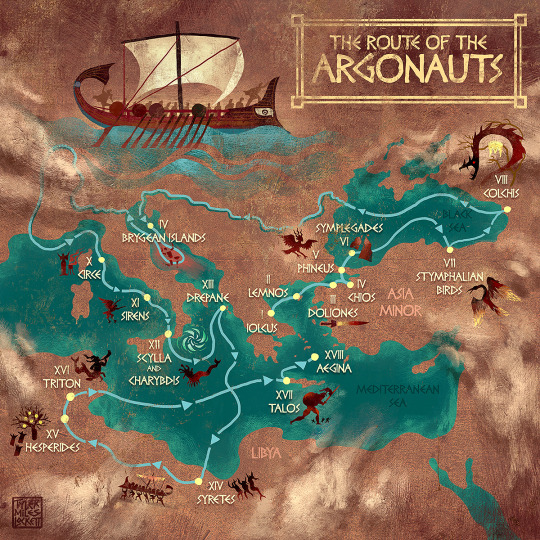
All right folks, Argonautica is a go! woohoo!
I wanted to start with a map just so i could wrap my head around the journey and get familiar with the major locations and events in chronological order. I'll do another image showing the major heroes, and then we can dive into individual scene/event illustrations. Ill probably do around 12 -14 images for this myth, so I'll have to be picky about which scenes i illustrate.
Argonautica 1: Overview and Map Route
I.) Iolcis; The crew departs from Jason’s hometown.
II.) Lemnos; the island tribe of women who murdered their husbands.
III.) Doliones battle: a mistaken battle results in the death of King Cyzicus
IV.) Chios: Hylas abducted by water nymph, Heracles left behind
V.) Phineus, a blind seer, is rescued by the Argonauts from Harpies.
VI.) The Symplegades (Clashing rocks) a treacherous passage.
VII.) Stymphalian birds: the heroes drive away the man -eating birds
VIII.) Colchis; Jason overcomes three trials of King Aeetes to obtain Golden Fleece with the assistance of the sorceress Medea.
IX.) Brygean Islands: Medea and Jason trick and murder her brother Apsyrtus to escape Colchian pursuit.
X.) Circes Island; The goddess purifies Jason and Medea of blood-guilt.
XI.) The Sirens; Orpheus drowns out the sirens calls with his own song.
XII.) Scylla and Charybdis; Thetis and Nereids guide Argo through
XIII.) Drepane Island: escaping 2nd Colchian fleet, Jason and Medea wed.
XIV.) Syrtes: three Nymphs instruct crew to carry Argo on their backs for 12 days
XV.) Garden of the Hesperides;
XVI.) Lake Triton: Triton, Son of Poseidon, instructs crew on passage to sea
XVII.) Crete: Medea uses her magic to defeat Talos, a giant bronze warrior
XVIII.) Aegina Island: the journey ove r, they perform rites for Apollo
Do you like this art? would you like to own a book jam packed with over 130 illustrations like this? Then please support my kickstarter for my book "lockett Illustrated: Greek Gods and Heroes" coming in OCTOBER.
click on my LINKTREE for the Kickstarter link to "notify me when the project goes live." In my linktree is also a link to join my free email newsletter for book updates in the coming months, with free Hi res art and a 25% etsy print shop discount!
#pagan#hellenism#greek mythology#tagamemnon#mythology tag#percyjackson#dark academia#greek#greekmyths#classical literature#percy jackon and the olympians#pjo#homer#iliad#classics#mythologyart#art#artists on tumblr#odyssey#literature#ancientworld#ancienthistory#ancient civilizations#ancientgreece#olympians#greekgods#zeus#hesiod
429 notes
·
View notes
Text
wanted to draw some seablings and water
so here they are :3
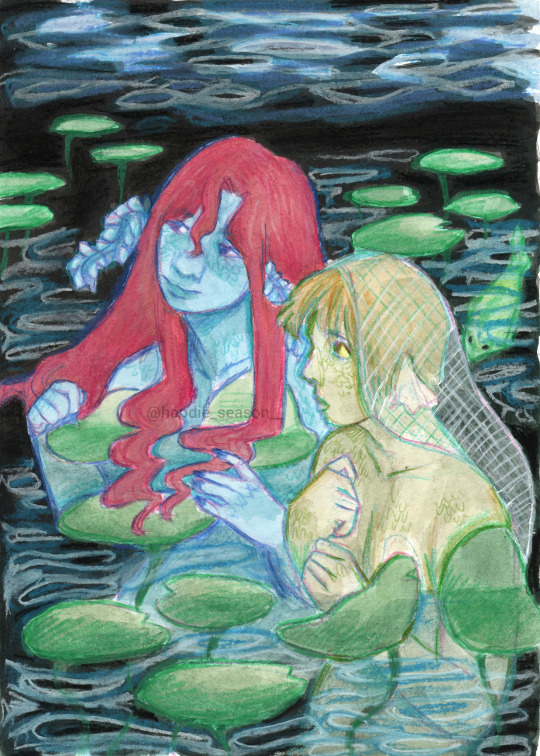
i remembered i own watercolors, and also a scanner lol (though i don't think i like what the scanner results look like that much,,, tho, it was better than using the phone camera as there isn't any annoying shiny-ness)
idk how to draw water but i think it turned out quite interesting looking
i used a part of john william waterhouse's "hylas and the nymphs" -painting as a reference
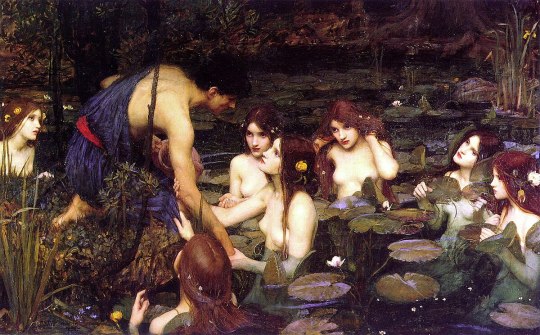
here is some progress pictures
my phone camera has trouble processing color pencils ig, you can see it looks a bit fuzzy for some reason
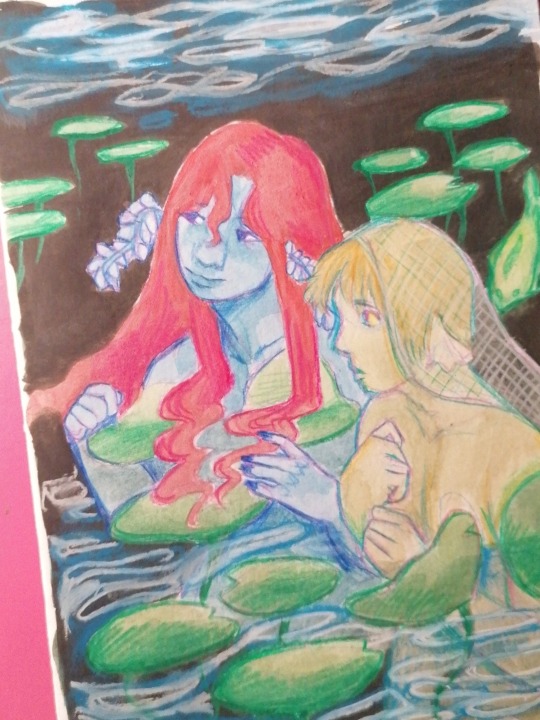

also i really like their expressions from the sketch, i did lose those in the coloring progress which is sad ;^;
btw feel free to give me any requests in the askbox abt empires (season 1) cast/hermits to draw as i enjoy working off of prompts (inspiration has been hard to come by recently, this is a cry for help lolol)
#empires smp#ldshadowlady#jimmy solidarity#mcyt fanart#empires s1#i hope I'm doing the alt text thingy right I'm really bad at describing things clearly lol
342 notes
·
View notes
Text


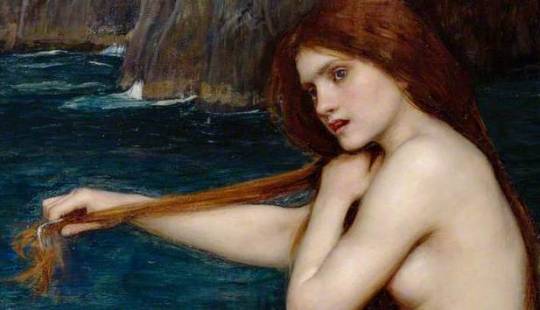
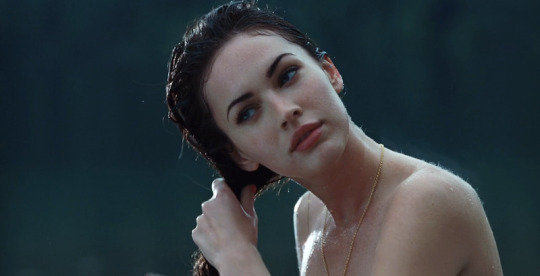

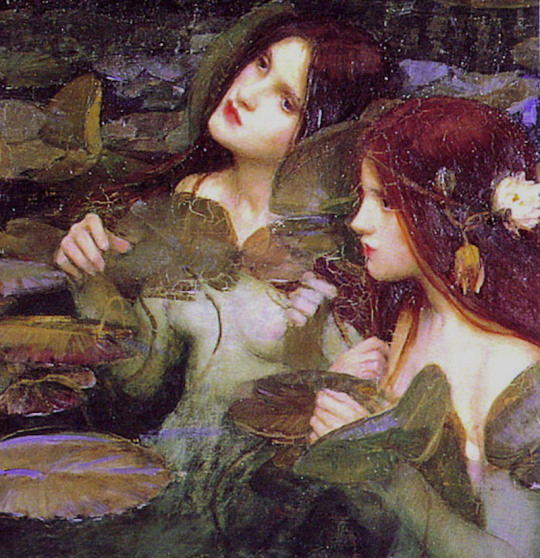
Jennifer's Body (2009) dir. Karyn Kusama and Undine (1872), A Mermaid (1900), and Hylas and the Nymphs (1896) by John William Waterhouse
All saw the shimmering figure that rose from the well and held out its arms to him. All saw how he vanished for a moment in those arms. He reappeared a dead man, his soul claimed by Undine, the spirit of the sea that he himself had chosen.
His feet sank deeper into the sand with every wave that broke around him, and at the shore's edge, his dog set up a howl. The mermaid laughed, tightening her hold on his neck. Droplets of water sparkled on her lashes. Now the two of them were in her element. She pulled his head down so that her mouth was at his ear. "Stay with me," she whispered. "What pleasures have you left on the shore?"
Farther along the coast, Hercules' beloved companion Hylas was seduced out of the world by a water nymph; distraught, Hercules left the company.
From Water Spirits (Time-Life Books)
104 notes
·
View notes
Text
˚₊✩‧₊Fountain girl ˚₊✩‧₊
König x black reader
König walks around restlessly on Halloween night.

Present --------》 skip to the past
A/N-This is just a short fic. I'd like to thank 2 people for these fics first @terra-713 for the original nymph, water woman /Hephaestus post @cinnamonbunboii for the second part of the the nymph fic, When I saw their reblog i rushed to write it. The other post should be coming out soon ( I promise the second half is better😭) not proofread
It's Halloween night and this poor man is wondering streets
He misses his Aphrodite, a woman that was never really his. The hugging, kisses, smiles, gifts those all consistute as things one does with their lover, in a relationship right?
He poured out his feelings to her, and he opened up his heart to her, spilling out the weak feelings that brought him shame. Was he supposed to believe that all that meant nothing. That him, his feelings weren't returned that the smiles, kind smile and words were just platonic.
It makes his stomach turn just thinking about it. Clinging tightly to his arm dropping kisses all over him, giggling, cooing at each other without a care in the world. He cant explain it but its like he walked in on his partner cheating he feels the same emotions shock hurt anger but when he gets angry when goes to rip the two of the apart, to complain to those around him, nothing. Its like no cares brushing him off and laugh, looking at him with confusion. König and her were never really going out, so what's the problem
It could be worse right, he could be roaming the streets on valentines, bumping into whatever unfortunate man wasn't watching their step. König knows in his frustration he'd beat the man to a pulp without a second thought, break their poor girls heart like he wanted to do to her . But it's Halloween, this was better. He could get drunk, beat,scare whoever, get rowdy with no real problems.
Yet he's been aimless for hours, nothing but alcohol filling his stomach as he walks the streets.
It's only on the third loop around the town fountain. Something peaks his interest, something different, enough to make him stop, to momentarily quil his anger.
Another benefit of Halloween is the girls and their tight skimpy outfits könig never been so grateful for a holiday, eating up the sight before him.
All of sudden könig very sure of the drinks he's had they hit him all at once distorting the space around you, fluorescent lights shining like fake stars around you. You're so beautiful, thick curly hair, like small currents wash over your shoulder. Your skin wet from the splash of the fountain. So peaceful and tranquil eyes glossed at the ground below you, he wonders if you're real, if you are you're not human, No human is this beautiful.
God he didn't know where to keep his eyes, you chest or legs. Bare Corset held your breasts together so well, scaning down that skirt, what a joke it was a belt at best but he got to enjoy the full show of your legs on full display. It a while about scaning your body 5 time before he noticed the crocked fairy wings behind you, cleary beat from the dancing you've done throughout the night.
Maybe like Hephaestus this was just him getting his nymph his new lover,Cabeiro or like Hylas he'd he dragged to his death and drown in another terrible relationship. He's hoping the first, he doesn't think he can take another heart break
It's daze in a moment he finds himself at your front, and for the first time, you look up at him, soft, droppy eyes, you let out a small sound as he stands before you. Seeing you like he can feel the blood rush south.
God he's hard
He must be drunk cause he thinks you're the most beautiful, he thinks he's in love, last week he was in love too. how fickle and weak is his love
#könig x black reader#könig x reader#x black reader#cod x reader#call of duty x black reader#cod x black reader#könig#könig mw2#my writing#call of duty x reader#cod x y/n
78 notes
·
View notes
Text
Sorry it’s been a bit since I posted some art on this, been busy. To make up for it here’s some old art/an edit I did of Hercules and Hylas . (Like super old I did these when I first had a tablet but was too nervous to post them back then x)
In the myths Hyllas is a fellow argonaut with Hercules who in some accounts was possibly romantically involved with him before he was kidnapped by water nymphs. Hercules in the tv show is always having romantic troubles and I thought it would be fun to include Hylas in there.
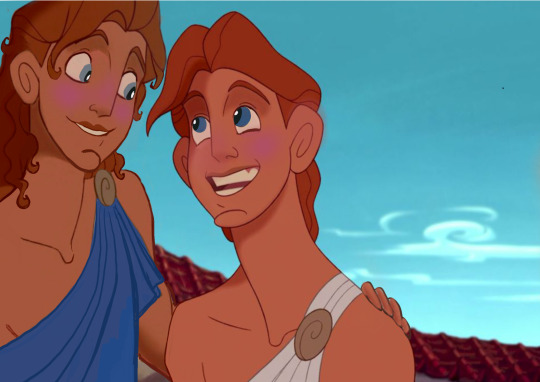
In the hypothetical episode Hylas is a transfer student to the Academy who joins the swim team and Hercules instantly gets a crush on him but is too nervous to ask him out. There would be a big athletic competition with a rival school coming up (possibly Troy again) and the rival school brings in some nymphs to kidnap Hylas so they can win by forfeit. Hercules finds out and has to go rescue him and they finally get to go on a date at the end ❤️
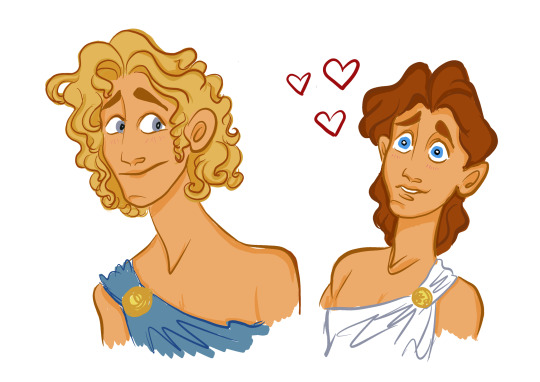
(Agh this art is so ooold 😅)
#my art#disney#disneyverse#hercules#hercules the animated series#disney tv shows#hylas and the nymphs#hylas
49 notes
·
View notes
Text
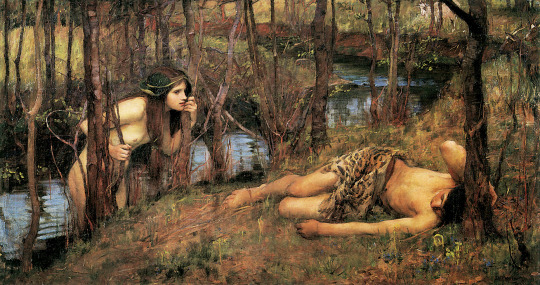
A Naiad or Hylas with a Nymph by John William Waterhouse (1893)
Hylas was the son of King Theiodamas of the Dryopians. After Hercules killed Hylas's father, Hylas became a companion of Hercules. They both became Argonauts, accompanying Jason in his quest on his ship Argo in seeking the Golden Fleece. During the journey, Hylas was sent to find fresh water. He found a pond occupied by Naiads, and they lured Hylas into the water and he disappeared.
#painting#john william waterhouse#oil on canvas#british painter#academic style#pre-raphaelites#greek mythology#arthurian legend#water nymph#mythical creatures#tasteful nudity#comprehensive artwok#talented artist#romanticism#oil#watercolor#realism#natural settings#symbolism#femme fatale#heroism#sketching
6 notes
·
View notes
Text


share ur well lore headcanons bro (via @crowdemon-boyo)
so this is actually something I already threatened to write about…a year ago: And I touched upon it a little (not required reading for this post but some more lore) but I didn’t really expand because it is one of my most unhinged izombie tangents.
As in, we're way down here, playing with the weird kids:

Before I get into this, I want to go on a VERY brief excursion about wells and their symbolic meaning(s). There is going to be a lot of talk about mythology and symbolism and parallels etc and if interrupt my later explanations every time to introduce one of these themes, it's probably going to feel a lot more hamfisted than it is AND be a lot harder to follow. Feel free to skip this part because I will keep the second part comprehensible for those who didn't read it - but also, I read up on wells for this and it's my post so I will talk about wells.
Wells
In short, wells had great importance for any civilisation throughout history – because wells were where people got water! And without water, there is no food, no drink, no livestock, no washing, no harvest - in short, no civlisation. So wells also found a way into many mythologies with a lot of different meanings. But wells can also hold dangers – like falling into them or the problems of wells turning bad or mosquitos and the diseases they spread (diseases that people likely didn't know were caused by mosquitos). And these dangers also found their way into myths and stories (especially because people couldn't explain many of these things).
Generally, the mythological symbolism of wells is very old and spread across many cultures - e.g., our tradition of throwing coins into fountains and wells likely stems from the tradition of giving sacrifices to the spirits/gods/nymphs looking after the well, keeping it clean and healthy and making sure the people have enough water. (One theory being that the biocidal qualities of copper and silver in the coin would help prevent bacterial infections - and that this effect would be attributed to the well-spirits accepting the sacrifices and creating healthier water!)
There are a few different core themes regarding wells:
health/fertility/long-levity/immortality/life/growth and transformation (I mention this one because it is a very important one, but off the bat: It’s also not really important for the purposes of this analysis. An example of this can be found in old Christian beliefs, where certain wells were believed to have sacred healing abilities and were the destination for pilgrims seeking relief from their ailments. One region where this is particularly relevant is the southwest of Ireland.)
wisdom/knowledge/prophecy/divination (this, e.g. can be found in Norse mythology very famously with the well of Mimir, where Odin pays with his eyes the price for all knowledge)
death/source of evil/connection to the underworld.In Greek mythology, wells and springs are associated with the Naiads, the nymphs. They personified the well and were worshipped for it - but they weren't always benevolent. For example, a very famous story is that of the lover of Hercules, Hylas, who dropped his pitcher into a well - and the Naiads fell in love with him and dragged him in. Another mythology where wells and magical ponds and fountains play a huge role is Irish mythology (which works nicely bc the McDonough family very likely have Gaelic roots, considering that Blaine and Angus both are Gaelic names and McDonough is also Gaelic). One example from Irish mythology are these stories from the Dindshenchas:
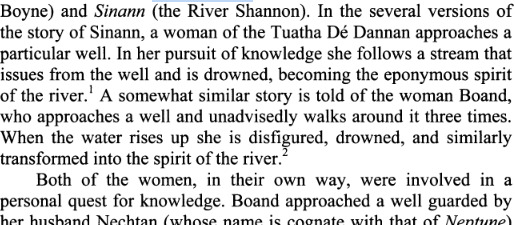

These themes also have had a big impact on literature and media staples and wells as a source of evil also appear often, like we see in The Ring.
Personally, I would argue that these categories are not distinctly separate - and that not all appearances of wells fall into these three categories at all. They're just very common. Another personal leap I would like to make is that not all the deaths associated with wells are addressing the mysteries of disease or the dangers of accidents (like in the case of Hylas who dropped his pitcher) or dealing with them. I also think there might be an association with wells/rivers/waters and suicide. The reason I believe that is the attraction of the well (Narcissus) and the number of tales of people (especially women) being turned into wells as a means of protection from duress in the earthly realm - it's not just accidents:
According to Pausanias, Alpheius was a passionate hunter and fell in love with the nymph Arethusa, but she fled from him to the island of Ortygia near Syracuse, and metamorphosed herself into a well, whereupon Alpheius became a river, which flowing from Peloponnesus under the sea to Ortygia, there united its waters with those of the well Arethusa. This story is related somewhat differently by Ovid. Arethusa, a fair nymph, once while bathing in the river Alpheius in Arcadia, was surprised and pursued by the god; but Artemis took pity upon her and changed her into a well, which flowed under the earth to the island of Ortygia."[8]
This is something that appears in other stories too - and you will notice that it also happens in the stories of Sinann und Boand: The well is specifically sought out with lethal consequences.
There is another, very historical reason why myths about wells and the fae and mythological creatures associated with them have taken on a darker connotation: Christianisation. A lot of pagan traditions would later be villainised, usually by associating them with demons or devils and demons. An example of this is a tale like that of Melusine. Originally, the stories of Melusine (a nixie, a Germanic female water/well spirit who in this case is half-woman, half water-serpent) and her mother were about how a human men fell in love with them and they would set conditions and boundaries to being with them - that they wouldn't see them in their natural non-human states. Something that their male partners would ignore, meaning that they spied on them in vulnerable states such as when they were bathing or nursing or birthing - leading to the water-spirits abandoning them. This is another very common theme to all these kinds of fae-stories: The creatures of the other realm might give you something (in this case, marry the human suitor) but there are always conditions and contracts attached - and if you violate them, your situation will usually be worse than before.
But Christian interpretation changed these stories. For example, Martin Luther mentions a new version of the story (which he believed in) where Melusine was actually the devil or a succubus, taking on a seductive shape to corrupt me. In this version of the tale, "a young man meets a beautiful woman named Melusina who has the lower body of a snake. If he will kiss her three times on three consecutive days, she will be freed. However, on each day she becomes more and more monstrous until the young man flees in terror without giving her the final kisses. He later marries another girl, but the food at their wedding feast is mysteriously poisoned with serpent venom and everyone who eats it dies."
this is another huge aspect of well-related horror and symbolism, the idea of a slow-working, consuming poison that takes and takes and depletes you - another famous example of this is H.P. Lovecraft's where a poisoned well kills an entire family, farm and surroundings: "Nahum said somethin’ lived in the well that sucks your life out. [...] Nahum thought it feeds on everything livin’ an’ gits stronger all the time." (Actually, Lovecraft, who really liked lending from old myth, also writes this in the Case of Charles Dexter Ward which reminds me a lot of Blaine's final fate: "The torch shook in his hand, but he looked again to see what manner of living creature might be immured there in the darkness of that unnatural well; left starving by young Ward through all the long month since the doctors had taken him away,"
I'm sure you can't wait to see how all of this is gonna be relevant in the context of the zombie-crime show.
The Well on iZombie
Time to subject you to the original point of this entire enterprise here:
The McDonough family
So I'm going to start with a quick re-cap of the canon well-lore on iZombie. We know the McDonough family is very rich and has a pretty big estate - which happens to have a well on it.
They are introduced with a very strong focus on the paternal line in three generations: The grandfather (I don't think he was named), Angus, and then Blaine himself. The original wealth of the family mostly seems to come from the business the grandfather built until he was finally usurped by Angus, who took over his business and whose main goal seems to be to accomplish even more and attain more wealth - but who, unlike his father, seems to have very little interest of actually being loved by his family.
There is also Angus' wife/Blaine's mother, who also goes unnamed and we never get a reliable account of her story, with most things about her being told from the point of view of Angus, often with the deliberate intent to attack Blaine, and sometimes by Blaine in order to confront his father. What we do know is that this relationship is very abusive and ended with Blaine's mother taking her own life when he was still a child. In a way, this also seems to be true of Blaine's grandfather, who we only know from Angus' and Blaine's accounts (with Angus being disgusted with his father for being fond of Blaine and treating him well ('babying him'), and Blaine clearly loving his grandfather a lot, even taking care of him all these years but finally sacrificing him for revenge against his father).
For the most part, Angus seems to be obsessed with attaining more power and more wealth - and believes cruelty, hardness, and remorselessness to be the only means to accomplish that. While he has some appreciation for the finer things in life (mostly wealth but also things that emphasise his own grandeur - Major once points out that Angus owns a bust of himself), one thing he resents about the rest of his family is their supposed 'softness' (in the case of his father and his wife) or in Blaine's case, his hedonism:

The key difference here being that Angus wants to attain money and power for the sake of having money and power (quoting "unlimited wealth! unlimited growth!" as the goal of everything he does) - while Blaine shows a far greater interest in the things money and power can get him - or that he thinks they can get him. (though I would argue that a lot of Blaine's story is about how Blaine eventually sheds a lot of that humanity, e.g. by killing his grandfather, turning back into a zombie when he used to prefer being human and even the way music seems to play a smaller role in his life in the last seasons - but we get to this in detail a lot, lot later).
Something that I think is very important for this entire analysis and that often goes unnoticed or underestimated about their dynamic (and why it is so destructive) is that as much as Blaine resents his father for all the abuse he inflicted on him, he also suffers from feelings of abandonment. Sometimes he actually seems more focused on the fact that his father took so little interest in him as a child and how little time his father spent with him (e.g. pointing out specifically that they shared 'seven meals together' in his entire lifetime) - feelings that make a lot of sense in the light of the fact that as a child, Blaine actually hoped he could appeal to his father to protect him from the abuse Frau Bader inflicted on him as well as the fact that he also lost the two other relevant adults in his life: His mother, who withdrew into depression and finally killed herself as well as his grandfather, who was hospitalised.
We also have to consider that as much as Blaine resents Angus' abuse of himself and his loved ones on a personal level (where it hurt him), he also internalised a lot of Angus' world-view in terms of cruelty and the drive for power on an impersonal level: He's also absolutely fine with hurting others to gain power. In fact, it is perfectly compatible for Blaine to accuse Angus of being a 'child-abusing son of a bitch' - while he himself murders homeless kids for profit. Which is another problem peculiar to abusive families or communities that also foster socialisation that is incompatible with the rest of society: Blaine didn't just grow up very lonely due to his family's very particular situation or his wealth, he also internalised a world-view that isolates him further into adulthood - the idea that absolute egotism and disregard for other's isn't merely acceptable, but also a position of strength, one of superiority, and that it is something an individual should strive for. That's Angus' ideology - and it is one that Blaine consistently displays throughout the show.
Because while Angus' abuse of Blaine is a product of this power-oriented worldview, Blaine never learns to reject that entire worldview on an actually meaningful level - he only ever learnt to resent his father's treatment of him. He still defines himself and his success and his world by those same standards. He hates Angus - but after a lifetime of watching Angus humiliate and mock and destroy everyone he perceived as weak, the only idea of value and safety Blaine has for himself is to define himself within the framework of Angus' approval.
The Well.
Back on it with the well!
We're first introduced to the well in this scene in season 3, ep. 8:
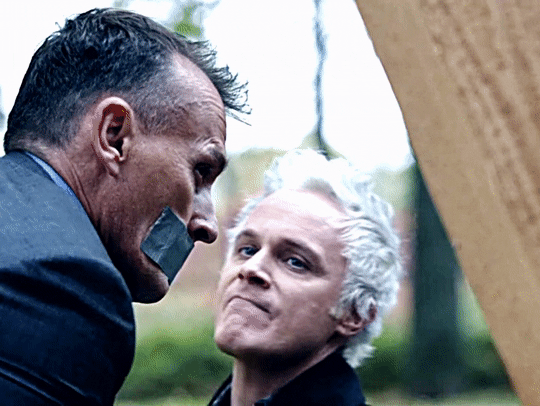


Without getting into the detailed immorality of what Blaine did surrounding his fake amnesia and Peyton, I think it is important to point out that this is happening on the tail-ends of Blaine's (failed) attempt to define himself outside of his father's ideology: He was willing to neglect his strive for power and his own values - in favour of being with another person. Which, apart from having been an absolutely horrendous thing to do another person, was kind of a big deal for Blaine (and I could already make some connections to the symbolism point I'm trying to make here. But I'm not sure if y'all out there are ready (unhinged) enough for that, at this point. We'll get there!)
We learnt that Blaine used this well for most of his childhood as a way to deal with his feelings, by using it as a wishing well to manifest his father's death - but also to count, very specifically, how often it happened. Blaine, it turns out, actually kept count of this, saying that it's 'about $1.40 in pennies down there'. Now, I was actually curious about this and it turns out that for victims in abuse situations, documenting and quantifying instances of abuse situations can be a way of keeping their sanity and trying to simulate some agency and control over the situation. (I also researched whether there is any meaning to the number 140 but I couldn't find one)
To make this very clear and explicit: What Blaine does is a very understandable, very human behaviour in response to the abuse he experienced. There is the big question what role we give Blaine's upbringing when we evaluate his actions as an adult. And personally, I think it plays a very big role. What I don't entertain is the notion that Blaine was simply always evil or so evil as a child that he deserved the abuse he experienced - that is something that the narrative very clearly identifies as the narrative of one of his abusers (Frau Bader), who thinks he was a monster, even as a child (very opposed to Angus' excuse, that Blaine was too soft and he was toughening him up). Blaine wishing for his father's death is not inherently evil, especially not for a child in an acute, multi-layered abuse situation. Using a wishing well to manifest the death of the man who abuses him, abuses his wife, is at least compliant with Frau Bader's abuse of him - and eventually even takes his grandfather from him, the only person still left - that is not 'evil' or immoral child behaviour. It's pretty balanced, all things considered. So what I'm going to say next has little to do with a moral evaluation or condemnation of actions - but a lot with the symbolism and being damnationed by the narrative.
Wishing Well
Earlier, I spoke of the origin of wishing wells as sacrifices to the well-gods, in exchange to which the spirits grant your wishes.
It's also in this context that I want to propose my first actually bold claim: The well does fulfil Blaine's wishes.
In fact, it probably grants the wishes of everyone who granted a sacrifice over the years. This is something I already once touched upon in the post I linked earlier and I'll link it again here where I listed every request Blaine has ever made of the well - and how they all came true. Every time Blaine is nearby that well and says that he wants something - it happens.
But: It also happens with a caveat. Some big drawbacks or logical loopholes. This is one of the most basic features in almost every kind of story, where you call on other-worldly forces: They give you what you want....except slightly to the left. It's the Monkey's Paw. Rumpelstilzchen. You find it with Djinni. The Sorcerer's Apprentice. Peter Schlemihl. King Midas. And very famously - the devil. While most of these stories are about warning you not to be cheap or not to get above yourself without doing the work or not to be haughty (e.g. The Sorcerer's Apprentice) - the deal with the devil is the Christian spin on it, warning you that sinful behaviour or a "literal" pact with the devil might give you what you want in this world, the devil is after your soul and wants to condemn you for the afterlife.
But that's another very important aspect: In most cases, you pay some sort of price. You make a 'deal'. There are exceptions to this - e.g. a magical artefact might grant you your wishes for free, even if get screwed over (Monkey's Paw) OR you already did the work to control the powers you're using (hence, you don't get 'punished' for "cheating" the natural order) and therefore get what you want - like in the case of the Golem, who only causes troubles if you did NOT do the work and make a mistake operating the Golem (like giving a faulty command or failing to remove the paper that animates the Golem. The Sorcerer's Apprentice was actually a gentile interpretation of a Golem story - and the mistake of the apprentice is that he didn't do ALL the work and overestimated himself and caused disaster/comeuppance.)
Based on the assumption that all the wishes uttered around the well on iZombie come true, let's examine the price of these wishes. I already went into this in the post I linked, but in short: These wishes are always accompanied by someone throwing something into the well. This is very literal while Angus is in there, because Blaine keeps throwing brains in there (not to mention threw his own father in there) and talking to his father (who in turn belives he's hearing the voice of God).
One example is in the first episode of season 4: Blaine talks to the well, complaining a) about how Chase has an army - and he doesn't. and b) that he wants to expand his business. He also complains about how much he hates working for Chase Graves.
Later in the same episode, Dino frees Angus from the well and this facilitates several things:
Another of Blaine's well-wishes comes true: In the previous season, Blaine talked at the well (while throwing brains in there) about how he wishes he had a father who loved him, the same way Baracus loves his own child and was willing to take a bullet for him. When Angus is freed from the well, he got re-wired into believing that he loves Blaine, that he has to make up for abusing him in the past and he wants to re-connect
Blaine gets his army: The cult of Brother Love who helps him stop the prison bus AND becomes his tool to carrying the zombie virus out of Seattle to help his real estate plan

He no longer has to work for Chase Graves after finding Renegade for him and on top of that, Chase Graves dies in the season finale (under the same guillotine that he showed Blaine in that first episode of the same season, in the Blaine-scene previous to the opening scene at the well. In many ways, his monologue at the well sets up Blaine's season arc for us.
He also gets his wish of expansion by the end of that season: Major makes him the number 1 brain supplier for New Seattle. He ends up rich.
So that's great, right? It's a wishing well! Post wrapped!
...
Except. If we entertain the notion that by some power of symbolism (and for the record, I'm w e l l aware that we're way past any writer intentions), the well actually does grant wishes, this raises one and a half big questions
how is Blaine being monkey-pawed?
and what about his original wish? What about Angus 'dropping dead'?
Well, let's first have a look at how all these wishes work out for Blaine:
his "army" meets the fate that many armies inevitably meet: Another army. They're destroyed spectacularly and his plan doesn't work out. Also his dad dies.
Blaine's own ill-gotten wealth and power go to his head and put him into a particularly vulnerable position: He loses everything and becomes the most hated person in all of New Seattle. After he was so proud of being a 'hero'
And ...did I mention that his dad dies? That was his biggest wish, right? Except...that first, original wish - that one took years of throwing in coins (and even even throwing in Angus himself) to fulfil - and that also came with a big fat caveat: By the time Angus finally 'drops dead', Angus was already Brother Love and made efforts to make (extremely toxic) amends in his relationship with Blaine. And not only that, despite having reservations at first, towards the end of the season and especially in the finale, Blaine actually built a sort of trust and opened up to having a relationship with this new version of his father for the first time (because that is the price of actually having the kind of relationship that Blaine wants with his dad: opening up. being vulnerable) - e.g. allowing him to talk about his mother and listening to him when Angus tells him he's proud. This is something I also wrote a long text about, but in short: By the time Angus dies, Blaine is, for the first time in his entire life, in a place where this would genuinely and first and foremost - hurt him.
So in short, that's how the well seems to work:
You feed it + you express a desire = you get what you want + eventually you get the opposite and get screwed over Monkey Paw style.
You will also find small examples of this. Like Blaine expressing that he would like to show his father his new car - and the first time Angus sees that car is in the scene in the finale, when Angus finds out that Blaine doesn't want to join the cult's suicidal escape from New Seattle and shatters the tentative relationship they had been building.
And I could count my eggs or whatever here, tell you that the well is a wishing well. Rest my case and go home. But...I promised you a little bit more. And we're in so deep now, there is no turning back. So.:
The Well is Hell (Hell is the Well)
Hades / Tartarus
Throughout his pre-Brother Love cycle on the show, Angus is often shown to have an avid interest in ancient history, especially ancient Greek history and mythology. This is already teased in his first appearance on the show:

Alexander the Great, himself the son of a Macedonian father and a Greek mother, traced his lineage back to the gods, even claiming Zeus his father. He also deeply valued Greek history and mythology,
The theme continues just a few lines later-
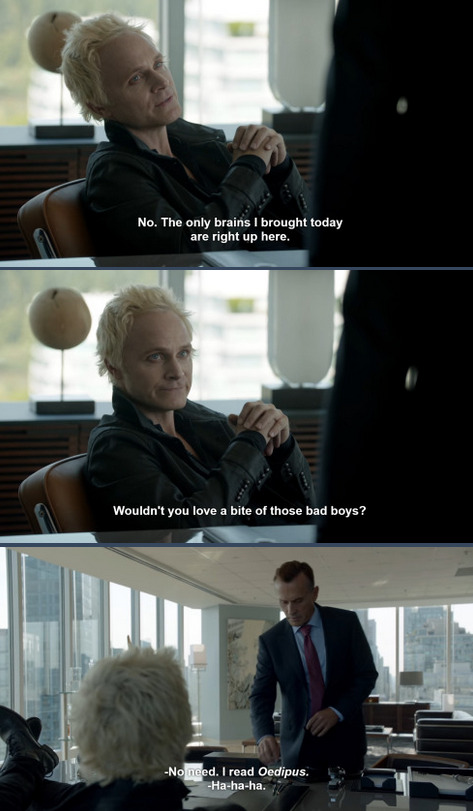
etc etc etc
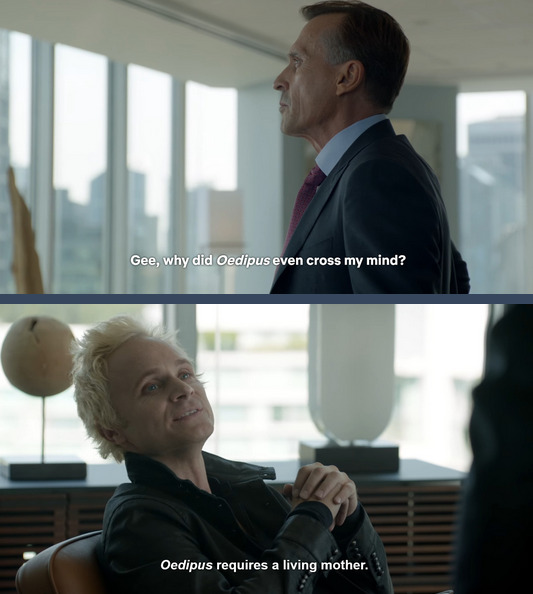
Angus' interest in ancient greek culture makes several appearances, usually in the context of Angus a) being disappointed that Blaine either pretends to or really doesn't understand his references and b) Angus seemingly not noticing that he himself really likes to reference tales where a father is killed by his son - and like in the Oedipus discussion, he usually positions himself as that father and Blaine as that son.


Cronus, like Angus, rose to power by overthrowing his own father (and also castrating him). So it's really in tune with Angus' self-glorification that he would compare himself to Cronus. Except, he presents this tale as if Cronus lived happily ever after as the king of the universe eating his kids.
But as is the entire point of this essay, you can only trick the powers of fate for so long: Cronus' wife Rhea (notice how Rhea stayed unnamed in Angus' account of the story much like the name of his own wife/Blaine's mother is never mentioned throughout the show?) eventually had enough of her husband's baby-eating habits. She took her youngest son and hid him - giving Cronus a bundle full of rocks to eat instead. And that young boy's name? was Albert Einstein. Zeus. Zeus eventually grew up and became the prophecied child to overthrow Cronus and tossed him - along with the other Titans - into the dark abyss of Tartarus, in the cave of Nyx:
We have some mythical description of what Tartarus was understood as:
"as far beneath the earth as heaven is above earth; for so far is it from earth to Tartarus. For a brazen anvil falling down from heaven nine nights and days would reach the earth upon the tenth: and again, a brazen anvil falling from earth nine nights and days [725] would reach Tartarus upon the tenth" (Hes. Th. 724-725)
"murky Tartarus, far, far away, where is the deepest gulf beneath the earth, the gates whereof are of iron and the threshold of bronze, as far beneath Hades as heaven is above earth! (Hom. Il. 8.14-15)
In Tartarus, according to one telling, Cronus lies in chains in the cave of Nyx (goddess of the night) where he is "chained within, asleep and drunk on honey – dreams and prophesies."
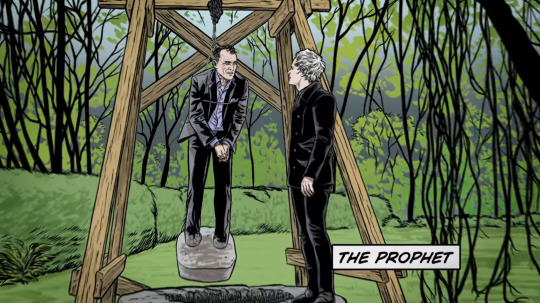
I think you know where I'm going with this.
And if you know where I'm going with this, you might have a very valid objection:
Originally, I claimed that the well would be Hades. Not Tartarus. These are two different spaces. And you're right! In this analogy, the well is Tartarus, the prison of the wicked dead, not Hades, which is the realm for all the dead. But considering that this metaphor is happening so far, far, far in the periphery of the funny zombie crime show, I am willing to let it slide as slight metaphor-mixing in the service of overall story-telling functionality.
Not to mention, Hades also makes its appearance, indirectly:
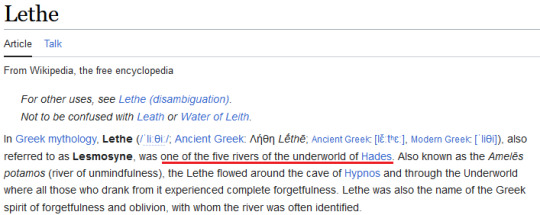
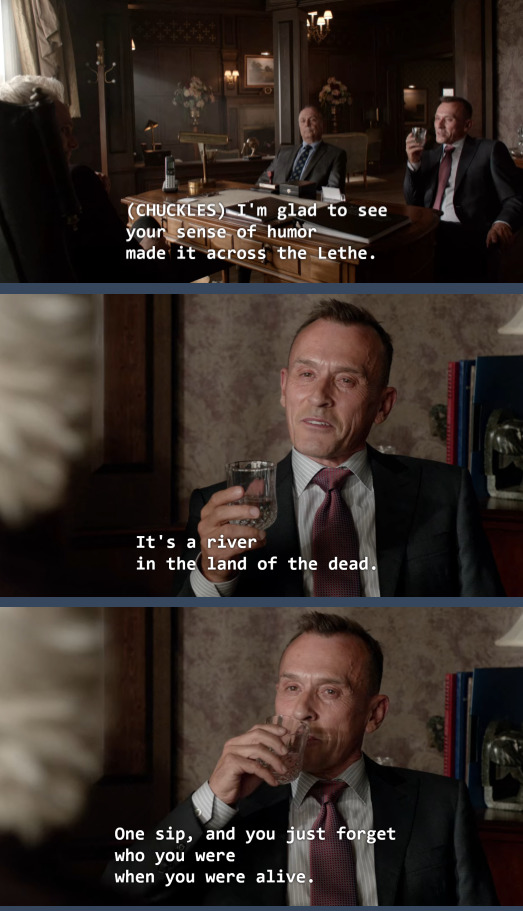
A few episodes after speaking these words while dramatically sipping from a glass of water, this man was found tossed in a mysterious well where he forgot who he was when he was alive.
There generally is a pattern of Angus, before his time in the well, predicting the future - without ever realising it. Not just in terms of Greek mythology but -
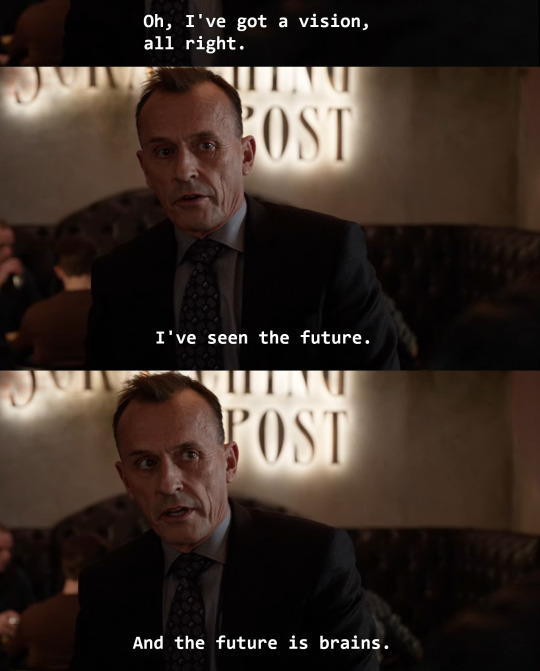
This is literally the same episode where he gets tossed into the well - aka the future where the only thing will happen is occasional brains being thrown down to feed him. Yeah, your future is brains alright. Just not in the big business sense that you expected.
So much like we have a mysterious pattern of the well granting wishes, we have a pattern of Angus prophecising the future - without ever realising it.
And this is also reflected in the specific choice of Greek myths that he decides to reference - and his clear lack of understanding of what he himself is literally implying (despite his own canonically vast knowledge of ancient myths and tales.) On the surface, the Cronos myth and the Oedipus myth have very little to do with each other. The reign of the fall of Cronos is a primordial creation myth of gods and titans. Oedipus' tale is (mostly) that of mortals.
The only things they have in common is a) the theme of people trying and failing to cheat prophecies (and thereby: fate, the order of the universe) and b) an abandoned and alienated son overthrowing and replacing his father.
Both with the Oedipus comparison and the Cronos comparison, Angus is trying to put himself into a position of power over Blaine (both with comparison he's making - comparing himself to the powerful Titan Cronos, comparing Blaine to unhappy Oedipus - and by making them in the first place, because he's trying to flex on Blaine with his own education/his disappointment in Blaine's lack of this education.
In fact, Angus' blindness to the actual prophetic nature of the things he says is already lamp-shaded in his first appearance. It is not just that he made another unintended prophecy (comparing Blaine to Oedipus, who unintentionally causes the death of his estranged father) - he also fatally misrepresents the myth: He compares Blaine to Oedipus, insinuating that Blaine's mourning of the death of his mother is excessive and that Blaine is resenting and punishing him because he holds Angus responsible for her death. But...that's not how the tale of Oedipus goes. By the time Oedipus meets and marries his biological mother, he had already (accidentally) killed his biological father. It is only when the truth comes to light that Oedipus' mother commits suicide and Oedipus blinds himself.
It is only after he 'drinks the waters of Lethe' - aka suffers ego death in the well - that Angus truly becomes a prophet and is aware of his making prophecies.
And I think it becomes even more damning when you realise that the fate of the Lethe strikes the entire paternal line of the McDonoughs (and no, I don't mean Blaine’s fake amnesia era. Though there was some real amnesia, for a while, let's not forget)
Grandpa McDonough suffered dementia after Angus overthrew him and eventually lost every connection to the world around him other than music. He finally dies at the hands of Blaine, who was planning to overthrow Angus by feeding him dementia brains.
Angus literally drank the waters of Lethe when Blaine threw him into the well. He died and became Brother Love.
Blaine tastes the waters of Lethe after the show ends - by turning Romero in the well.
Family legacy, honour, masculinity etc. are all values that are very important in Greek myth - and they are things that Angus is often shown to care about a lot (especially illustrated by the fact that he keeps attacking and humiliating others for not living up to those values). On the other hand, in Greek mythology, family dynasties tend to end in horrible tragedies - for many reasons and very often because of prophecy or hubris/arrogance. By the time we encounter the McDonough family, the inciting dishonourable act of hubris and disrespect has already been committed - Angus taking over his father's business by underhanded means and having him hospitalised. He had his father declared mentally unfit - and one after another, everyone in his family actually loses his mind and (more or less) eventually dies.)
Arguably, losing your mind and your identity is more relevant an ending to a person's life in this family than actual, physical death is. Only losing yourself mentally first facilitates physical death. Meanwhile, dying doesn't necessarily mean a final end - especially Blaine bounces back from the dead with impressive frequency. This is even true for Blaine's mother, who first withdrew herself and faded and removed herself from the rest of the family until she finally ended her life - losing all agency and independent identity in the process, to be only defined by and in Blaine's and Angus' narratives. (In fact, even though Blaine's grandfather's name is lost too, we get some pictures of him: We see him, we know what kind of art and music he liked, we see old photos of him on the wall of his hospice room.)
Blaine's mother isn't really given that same dignity. She is spoken of, but never really as an individual. She's mostly an idea. A ghost hanging around in the background of some of their conversation. She doesn't pass the lamp-test. (the test where you replace a female character with a fancy, expensive lamp - and then see how much this would impact the plot.)
The most important things to take away from this section:
Something that I think is very important here is that Greek mythology and especially Angus' fascination with it also serves as a visualisation of the rift between Angus and Blaine. Angus is frequently annoyed when Blaine doesn't understand his references to a subject that clearly means a lot to him. He clearly feels entitled to an heir with the same interests as him - a continuation of his legacy. We know he wants to be immortal and one way to live on is through your family and in a very patriarchal family, the way for a father to live on is through your son.
But...Angus also never put in the work. He never gave Blaine any good reason to emulate him or to take an interest in his father's interests. He never gave Blaine any incentive to spend time with him and do anything together. He never even gave him any reason to love him. He just expects Blaine to function as his heir because he is his son. But he...never really tries to be a father beyond the biology of fatherhood (he literally calls Blaine a 'waste of his sperm' before he gets tossed into the well). The person Blaine actually emulates - is his grandfather. The person who, according to Blaine, actually loved him. Blaine specifically says he has his love for music from his grandfather and even (claims he) takes after him in looks.
If we do take that leap of faith and consider that most of Angus' Greek mythology analogies have a prophetic character on some level that he isn't aware of (and that the show also frequently identifies him as a prophet in season 4) - then in these prophecies, the well is positioned in the symbolic role of Hades or Tartarus or rather, a wellspring to Lethe, one of the 5 rivers of Hades.
Another (third?) thing is the disappearance of Greek mythology from the show. After Angus' time in the well, the references to Greek mythology stop - and Brother Love isn't exactly invoking the Greek pantheon. Instead, the Cult of Brother Love leans much more closely on Christianity - and it is even confirmed what a great change that is: In S04E10, he tells his congregation that Frau Bader was 'always concerned about his immortal soul' - and that it should be very surprising for her to see him now as a priest. There are some references to it, like the statuettes we see at the McDonough Estate but those are old, from pre-well times.
So this brings me to the next part of my little essay here:


(pls don't make me spell out the halo-thing)
Christianity The Cult of Brother Love
Some brief disclaimer: I do not intend to talk about religion here. I AM going to look at Christian symbolism and the use of symbolic language on the show in order to decipher subtextual connotations in the same way as I did with Greek mythology earlier. My personal belief (or rather: lack thereof) does not enter in here.
First of, it's important to make a certain distinction: While the Cult of Brother Love is definitely inspired by Christianity and Christian imagery, it is not fulfilling many of the core tenets of Christianity. (e.g., I don't think there is literally any mention of Jesus other than Blaine asking once who the 'zombie-messiah' is going to be and Brother Love implying it would be him). I think there is a meta-reason for this (obviously, making it too Christian would piss a lot of people off). Also, since this entire cult grew out of Angus' delusions in the well and since Angus was canonically never particularly interested in Christianity, it makes sense that this would result in a very warped version of the original.
However, the change from the original ancient greek philosophies that Angus emulated vs the bastardised version of Christianity he practices in his cult does incorporate some of the core tenets of Christianity like the idea of universal morality which hellenic paganism didn't have (the cult actually looks down on 'heretics' and non-believers and thinks that every zombie needs to join the church and be baptised and that people who refuse are the enemy), repentance (Christianity has a much greater focus on the option of repenting for your former sins and being forgiven, while in ancient greek stories, usually actions -cause- the consequences - and while you can ask the gods for forgiveness, they are fickle and fallible rather than all-loving and all-forgiving, so whether they forgive or not can be mere coincidence), in fact: one, all-knowing, all-powerful god (Angus believes that the voice he heard in the well was the voice of god - and he is tricked again when Blaine has Don E throw brains into a wood-chipper to convince him that it is raining brains. He does this because he now expects a god who loves him and wouldn't mislead him and who knows everything and wants zombies to be safe.)
The well becomes an important aspect of the way Christian elements are used and turned on their head (!): Wells and waters play an important role in the symbolic language of Christianity, e.g. the idea of being cleansed by baptism and the powers of holy water cleaning and warding off evil and being used to bless sacred items and places in Catholicism.
There is a very important passage in one of the communal affirmations of the cult:
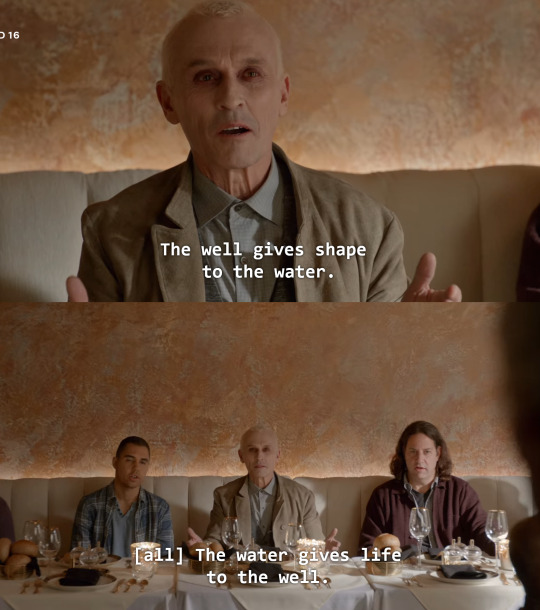
I believe this to be a vague meta-reference to a story from the New Testament, John 4:10-15, where Jesus meets a Samaritan woman at a well. He asks her for water because he is thirsty. During their conversation, Jesus shifts the conversation from the literal, physical water of the well to spiritual water e.g. he compares having faith to 'drinking living water' -
Jesus answered her, “If you knew the gift of God and who it is that asks you for a drink, you would have asked him and he would have given you living water.”
“Sir,” the woman said, “you have nothing to draw with and the well is deep. Where can you get this living water? Are you greater than our father Jacob, who gave us the well and drank from it himself, as did also his sons and his livestock?”
Jesus answered, “Everyone who drinks this water will be thirsty again, but whoever drinks the water I give them will never thirst. Indeed, the water I give them will become in them a spring of water welling up to eternal life.”
The woman said to him, “Sir, give me this water so that I won’t get thirsty and have to keep coming here to draw water.”
The reason I believe this to be a reference is that Brother Love also frequently makes the promise of 'feeding' - his cult, promising that by following him they will never be hungry again.
But it also gives us some idea about the relationship between the faith of the cult and the well:
The 'living water'/'water of life' in the analogy from the bible represents a relationship with god. But taking personal belief out of the equation, the Christian 'relationship with god' is simply - faith. It's believing in god. Just like the cult believes in their idea of god. Their idea of god is ...that god considers zombies the chosen people, that he wants them to destroy humans and eat them, that he loves zombies a lot. But this faith/water was given shape by the well: This 'God' was just Blaine talking to his father in the well and Angus who was slowly losing it trying to decipher meaning from his words.
This is also symbolised by Angus often echoing Blaine's words in a slightly warped way.
One obvious example:
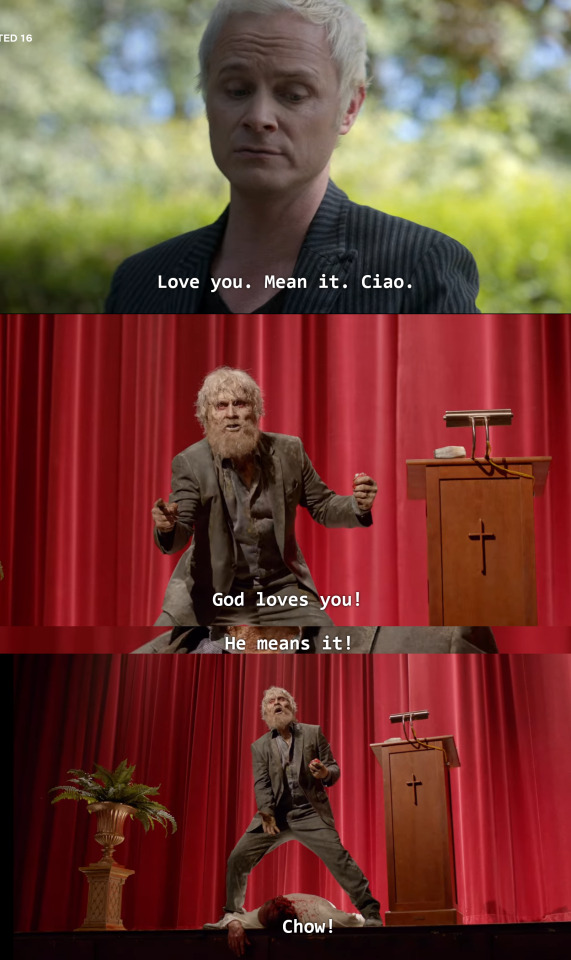
Basically, the well gave shape to their faith/the water by running interference between what Blaine said (wished) and what Angus heard and what Angus (driven insane by the well) is now parroting to his followers. And if we're still working under the assumption that the well is fulfilling the wishes of the people feeding it (coins, brains, people), then this interference, this 'giving shape' directly results in the well granting Blaine's wishes:

In fact, something that I find very important here is: Blaine never said the words 'I wish I had an army' - much less 'I need an army' or 'give me an army' like Angus cites it. While inside the well, Angus remembers hearing something entirely different from what we were shown was spoken into the well.
The reason why I think this is very important is tied back into the function of the well as a wish-fulfilling device: As I mentioned earlier, devices that fulfil wishes usually come with some sort of caveat. Sometimes, the wording is used against the person speaking the wish in an overly literal way (this is especially important in stories where a person has but a limited number of wishes because now they have wasted one). This, however, doesn't seem to be the case with our well here, because Blaine doesn't even need to express a wish - instead, through the interference of the well, his subconscious desires or the implications of his words are manifested into commands. That's how connected the well and he is at this point (I'll elaborate on this point later)
The well doesn't only give him what he says he wants - it gives him what he really wants. (In fiction there are usual different aspects of character intent. Usually, these are simplified into want vs need but personally I like to separate them even further:
What a character says they want (what they tell others)
What a character wants (what they think they want)
What a character really wants (the subconscious desire that is behind that conscious wish)
What a character needs (usually opposite of their actual wish/the thing they come to realise is missing from their lives and that they give up their wish for in the end)
For example, what Blaine says he 'wishes' when he's near the well is that his father would see his new car or he talks about what a brilliant businessman he is and how everyone in the city looks up to him - what he really wants is the satisfaction of proving his father wrong about what a failure he is as well as Angus' approval* because-

But what he actually needs is...to stop letting his father and his fucked up childhood have such an influence on the life he's living. What he needs is some actual human connection and self-actualisation.
*This is another very interesting aspect of their interactions: Angus again and again reiterates how successful Blaine is specifically as a businessman and how proud he is of Blaine for this. He says it at Romero's, he says it during his services, he says it to Liv even (showing that he genuinely believes this and doesn't just say it to prop up Blaine or get brains from him. He suddenly genuinely believes this) --- and the reason that this is interesting is that as Brother Love, Angus doesn't really care about money or riches anymore. He stopped caring about his own wealth, he gives donations to the poor. One of the first things he says, when he gets out of the well, is to call Dino a 'filthy lucre' (the word combination filthy + lucre is mostly originally used in the bible) when he tells his girlfriend that he wants a reward for freeing Angus. We know Angus didn't use to consider Blaine a real 'businessman before the well, we know he doesn't care about money after the well - and yet, he still feels somehow compelled to praise Blaine for exactly these things. The only thing that changed in this regard is that Blaine poured a lot of energy into that well, talking about how he's such a great businessman (and mentioning that it hurt him that his father doesn't think so.) This is another subconscious desire of Blaine's that the well fulfils - but it really isn't what Blaine needs or is good for him. What would be good for him would be to remove himself as far from this entire situation as possible. But instead he comes back and keeps coming back. The first thing he does when he finds out that he's a zombie is seek out his abusive father and infect him - out of all rich people he can and did infect later on. He was always waiting for that moment of revenge. And the thing is, Blaine probably felt like he was free after he grew up and cut ties with his father (or got cut off) - but really, he never has been free, or he wouldn't have come back after all this time.
Even more important in that regard and something that I rarely see anyone talk about: He never killed his father, as I mentioned, - and he never killed Frau Bader. Instead, he's upset by both of their deaths - despite all the people he literally murdered in cold blood, he was clearly not ready to see the two people die that he hated the most in the world.
The reason I think that this is interesting is that - the 'army' thing just showed us that the well doesn't need Blaine to (be able to) express what he wants for the well to make it happen. As long as he's throwing things inside the well (brains) and alluding enough, the well sets it into motion. And I feel like it's here that we encounter a problem: As a child, Blaine wished that his father would drop dead so that the abuse would stop. But he also wants a father who loves him. He wants to have a meaningful relationship with his father - throughout the show, he frequently seems at least as angry with Angus for abandoning him as he is with him for abusing him. Now, these are two very conflicting desires - but by turning Angus into 'Brother Love' and then eventually having him go on a suicide mission to be killed by the US army accomplished both - in the most painful fashion for Blaine, who finally was starting to develop some trust in this new relationship with his father, only to see it destroyed in the worst way possible.
There is something else I find very interesting in this regard. Now, if we follow the earlier assumption that the whole symbolism of Greek mythology functions as an illustration of the rift between Angus and Blaine and of Angus' feelings of patriarchal entitlement and ownership over Blaine as his heir as well as his feelings of anger and disappointment at Blaine's failure to live up to his expectations - then the disappearance of Greek mythology from Angus' repertoire when he becomes Brother Love also becomes significant. It shows a (seeming) change in his attitude. Which holds up bc in season 4, Angus (seemingly) has a very big change of mind, both about his own philosophies as well as his son.
So far, I've focused a lot on Angus' role in all of this - which makes sense. Because the Greek mythology stuff is mostly happening in Angus' side of the court. Blaine has very little interest in any of it.
In fact, there is a very obvious and very important fact that I frequently see neglected when people speculate about Blaine and his family: Blaine grew up with 1. a mother who checked out mentally, 2. a father whose entire care accumulated to 6 shared meals and 140 pennies worth of severe abuse incidences and 3. a grandfather who eventually also disappeared. As much as Blaine defines himself by his father's values - most of the time, he was raised by someone else. The person he probably spent most of his time with (at least further into his mother's decline) was Frau Bader.
This is a woman who had so much influence in the household, Angus was willing to let her inherit his fortune if Blaine killed him. Someone who could make a dog disappear without anyone asking any questions. Someone who could berate her own boss about his religion.
And that's one thing we learn about Frau Bader is that she is very religious. Specifically, she is very Christian. Blaine, throughout the show, is shown to have a lot of contempt and disinterest for religion and - especially (x) Christianity, something that especially becomes evident in his interactions with Gabriel and his first encounter with one of the cultists.
But there is one noteworthy relevant difference between Blaine's contempt for Christianity compared to his contempt for his father's obsession with Greek mythology: He also seems to know at least some things about it. In fact, he shows a quite detailed knowledge of it, beyond what is the natural osmosis in a culturally Christian society.
While he doesn't get understand his father's obscure references to Greek mythology, he understands - can even make - obscure references to the bible - e.g. comparing his own attempt to tempt Gabriel into giving him the tainted Utopium recipe to Jesus tempted by the Devil during his 40 Days in The Wilderness. This is not...something everyone knows. Considering that he seemingly didn't have a father who valued religious education (prior to being brainwashed by a well) and Blaine doesn't seem to have an inherent active interest in theology (rather, he dislikes it and I don't see him seeking out Sunday school or reading the bible at any point during his adult life - the most likely implication is that this was passed down by Frau Bader. The fact that Frau Bader also tried to proselytise to Angus might even be the (literal, non-symbolic, non-Lethe,) reason why Brother Love's particular insanity takes this shape. And if she proselytises to her boss, what are the odds that she wouldn't proselytise to the child in her care?
Blaine's seeming disinterest and contempt for Christianity also reflects his complicated relationship with his abusive nanny: On the surface, he doesn't care about Frau Bader one way or another. He never actually bothered killing her. He didn't even infect her in order to obtain power over her or humiliate her somehow (likely because she's not rich enough for him to exploit her in any meaningful fashion that would be worth the added emotional baggage of having to deal with her again). Much in the same way, his seeming disinterest and his dismissive attitude towards Christianity is belied by the fact that we learn that Frau Bader was a very religious person - and that her religious beliefs played a significant role in her abuse of Blaine: She believed that Blaine's transgressive and rule-breaking behaviours as a child made him a 'monster' that needed to be disciplined.
The word 'monster' is very important here imo because it is a word that speaks to a belief in inherent evil. Now, Christians believe that (all) humans are inherently sinners (not monsters). Human nature makes them imperfect and fallible - but they also believe that everyone can be saved through repentance and a relationship with God/Jesus. And here I think it is also very interesting that lack of belief doesn't seem to be what sets Frau Bader off: Clearly, she thought that Angus could be saved if he only started believing and going to church since we know that she was always 'worried for his immortal soul'. Now, we cannot know whether to her religious-nutjob-brain there was something about child-Blaine that set her off in particular or whether she's just an abusive person and inflicted his on the first best helpless person she had power over (or maybe even every child she had power over). What we do know is that for some reason, she thought that Blaine was abnormally evil or monstrous somehow. (we often hear some stories about how disruptive Blaine was as a child, but something that I think is important to point out is that most of these stories are implied to have taken place when he was no younger than 9 or 10 years old while Frau Bader was implied to have joined the household much earlier and Angus' abuse probably going on at least as long, likely longer than that. So it is very likely that the disruptive behaviour is a result of the abuse, and not vice-versa).
The reason I'm bringing this up is the following:
We know that Blaine is pretty obsessed with power - he's literally talking about how he's going to run the entire city. And I feel like this scene comes very close to touching on the origins of this: Power means safety. In his childhood, while Bader was the person who spent the most time out of all adults having power and authority over him (and abusing that authority), Angus was objectively the most powerful person in his life. That's why he asked his father to protect him from Bader. (btw, I also consider the fact that he quotes himself calling Angus 'daddy' when he asked him to help him another indication towards how long Bader was working in their household and how early all of this started.).
As far as we know, he never threw pennies in the well over Frau Bader - just like he never went after her the way he went after his father. Just like he represses his religious trauma by neglecting the issue and making light of religion and avoiding it, he deals with the Bader-situation by ignoring her and minimalising the impact she had on him. This is very different towards his attitude regarding Angus. And this makes sense considering Blaine's whole worldview: Family is one of the few things that actually matter to him. Bader isn't family and while he detests her as a horrible person, Angus, as his father, owed him much more - and therefore betrayed him far worse. That's why he can yell and shout at his father for being a 'child-abusing son of a bitch' while he himself killed dozens of homeless teenagers.
Another thing that stands out: This very scene is referenced again in Frau Bader's death scene:
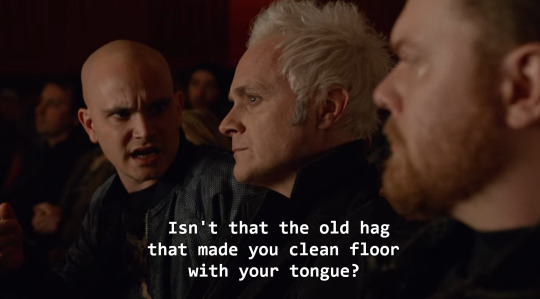
Now, this line clearly exists primarily because we haven't seen or heard from Frau Bader since season 2. But out of all the things that Don E could have said (or Blaine could have said) to identify her for the audience, they chose to reference this scene - to which Don E wasn't witness. We never learn how Don E obtained this particular information about Blaine's childhood, so it would have been far easier to refer to her in other ways. For example, Don E walks in on them listening to Angus' video will.
The reason I bring this up is because they reference the scene where we learn that Blaine asked for Angus to help protect him from Frau Bader - in the very same scene in which Angus, now as Brother Love, kills Frau Bader. And even also acknowledges that he knew of the abuse and did nothing and that he specifically failed Blaine in his duties as a father.
And here is the thing about this:
If we assume that Blaine's resentment of his father is not just rooted in the abuse and not just rooted in the trauma of negligence but ALSO specifically in his refusal to protect Blaine from Frau Bader (pretty canon, based on the torture scene in The Whopper) AND if we assume that (based on the army-thing) that the well facilitates Blaine's wishes even when they're not explicitly stated, then Blaine's wish for Angus to 'drop dead' also entailed that particular grievance. Until eventually, in the same breath as fulfilling Blaine's wish for a father "who cares that much" (another wish that was subconsciously implied in Blaine's resentment of the father he was given), the well gives him a father who does defend him. And that's how Brother Love specifically ends up killing Frau Bader.
(which raises another issue for me: On the textual level, I attributed Blaine's ... disinterest? refusal? avoidance? to kill Bader for what she did to him to his refusal to seriously connect with his trauma and accept what has been done to him. But on the metaphysical whatever-level we're moving on, it makes me wonder whether Blaine was even ever able to kill Bader - or whether that role had always been assigned to Angus all along)
Hell Is The Well
I mentioned earlier that the cult has a pattern of turning things on their head. And some of that is simply because it's a cult and therefore engages in things like behaviour-control, information control, thought control, emotion control etc. and warp any actual Christian teachings to fit the cult-agenda.
But a lot of that also comes from the fact that Brother Love is working under a false assumption - one that as the audience we know to be false: Brother Love really believes that he received/receives signs and messages from god and is doing his bidding.
And it's not just that confused Blaine's voice with the voice of god - he completely conflates them:
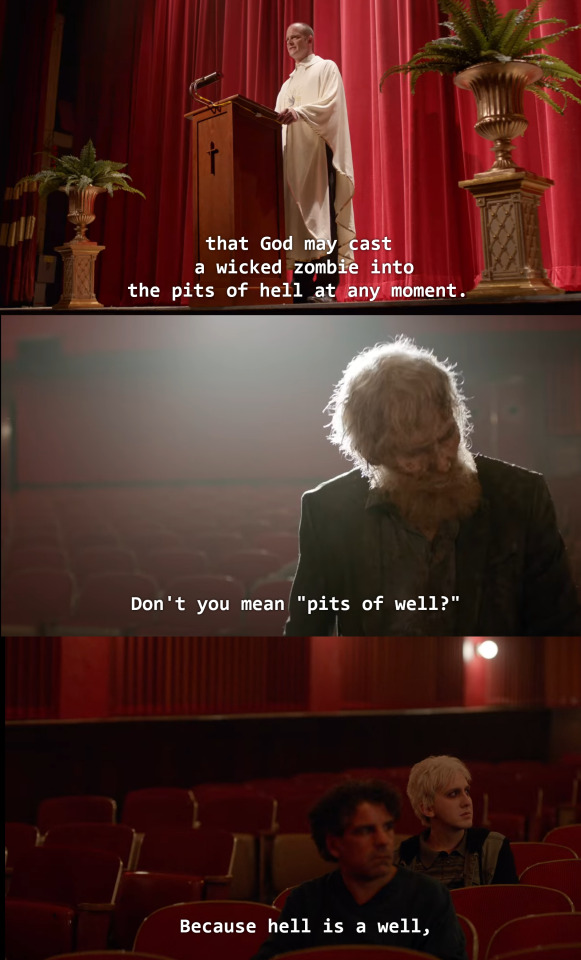
He believes that god threw him in the well and spoke to him there and even when he's back out, he points out that Blaine's voice reminds him of the 'voice of god' and names him the 'zombie messiah'. (we also see a complete conflation of family relationships /identities here with Brother Love going back and forth between referring to zombies as his siblings and his children, casting Blaine in the role of god (the father) but also as his son. Just like we have the conflation between Blaine as a mortal (or zombie) with him being 'god' while on the other hand, he's also a character commonly likened to or compared to the devil throughout the show (which would change the implications of the well/hell and Blaine's role in brainwashing Angus and Angus' misreading of the situation entirely.) Basically, through the interference of the well, Angus doesn't really seem to know who Blaine is anymore. It seems to kind of splinter his identity.
This warped perception is also an evident in the 'poisoned chalice' aspect of Angus' 'cleansing' in the well (showing us that this is not a real cleansing or something 'good') and 'purifying' and Blaine's role in it are also illustrated by the fact that Angus does not become a good person - or the heaven-sent prophet he considers himself:
As Brother Love, Angus simply exchanges his extreme individualism and personal superiority complex for a new kind of chauvinism - with very similar results:
Angus believes that he is better than everyone else. Brother Love believes that zombies are better than everyone else.
He takes himself out of the equation, even stating that he isn't sure that he will see all his prophecies come true - calling himself 'merely the Baptist John', while simultaneously being the driving central force behind the cult, literally controlling the members' minds and how they move and how they eat and that eventually, they go to certain death with him. At first glance, what he offers is charity, but he also demands complete obedience in return. And like any extremist, he also starts cannibalising the cause and the people he's allegedly defending - which means that any zombie that steps out of line or allies with the humans or doesn't support the cult is a heretic. Those zombies that bought the zombie cures? They're heretics deserving of death, in his eyes. Filmore Graves soldiers are all deserving of death in his eyes.
As Angus, he talked about 'unlimited growth, unlimited wealth' - something that is impossible to accomplish on a planet of unlimited resources (especially if your product is human brains and your customers need to eat them to survive). This kind of attitude of rich people is what is destroying the planet right now. And because he wasn't really changed or cleansed or "purified" in the well, he simply becomes the harbinger of the apocalypse in a much more literal fashion:
He eventually ends up riding out on horseback, about to bring the end of the world because Blaine told him he had a vision that they were supposed to turn 'half the population of the earth zombie, keep the other half for food', meaning that one half is going to wind up being eaten, the other half is going to starve as Romero's. (no, seriously, they HAD to include a horse for this. Which...makes him either War (it's a red horse) or Death (and he who sat on it had the name Death; and Hades was following with him. Authority was given to them over a fourth of the Earth, to kill with sword and with famine and with pestilence and by the wild beasts of the Earth.)
Now, I don't want to dissect all of this, because this is supposed to be the well-post, not the brother-love-cult post - but I think it is fair to summarise that all of the misconceptions and the entire horrible development of this cult and the symbolism around it make a lot more sense if you take them by their world - the well is hell. And hell is where their 'living water' (aka faith) came from.
Blaine & Loss of Personhood
I mentioned earlier that we were going to talk about Blaine losing himself. Which is another big feature of well-stories - drowning, becoming the well, forgetting who you are...) There is one myth I didn't talk about so far that might come to mind. For one, it doesn't feature a well, specifically, but rather just a body of water. Also, the title is very loaded and might raise wrong expectations regarding where I want to go with this entire post. And lastly, I really only wanted to get there after I explained a lot of my reasoning already, especially the conflation of identities we encounter around the well and Blaine's person.

I know this is a step back towards Greek mythology but let's take a moment to talk about Narcissus.
To get this out of the way with, Narcissus is obviously most famously the guy who loved himself so much that he fell in love with his reflection in a pool of water. And...honestly, a conversation can be had about Blaine's degree of self-obsession and arrogance etc. but ...that's really don't where I want to go with this.
Because while Narcissus is obviously mostly associated with the character trait we named after him - and even the medical condition of "Narcissistic Personality Disorder" - an obsessive love of self is by far not the only theme or interpretation of the Narcissus myth. Important themes also include a loss of self, a yearning for something that isn't real, the rejection of others and the doomed attempt at complete independence.
To give you a brief summary of the full Narcissus myth: When Narcissus was born, his mother asked a prophet (here we are again) whether her son would live a long life and the prophet - Tiresias - prophecies that he would live a long life unless he gets to know himself. Narcissus eventually grows up to be quite the handsome guy and is courted by many men and women including the nymph Echo, another very tragic figure in Greek mythology. Narcissus rejects all of them - usually very haughtily - and especially Echo, who had her life ruined by a curse courtesy of Hera (yeah, one of those stories) and thought she had found love and companionship with Narcissus, is absolutely heartbroken. Nemesis, the goddess of retribution, steps up for the humiliation Echo has suffered and curses Narcissus to fall in love with his own reflection - which he does. Eventually, he just starves and withers away at that poolside, yearning for the elusive man in the water. (also, poor Echo has to watch all of that and eventually runs away into a cave to die there)
I mentioned some interpretations of this, other than the most famous one: For Narcissus to (rudely) reject all these proposals also meant a serious rejection and withdrawal from society at large. One interpretation of these rejections is a refusal of Narcissus to let anyone have power over him (Ledermann, R. (1988). Ovid’s Myth of Narcissus. British Journal of Psychotherapy) - There are different ways to translate Ovid here, but basically Narcissus says he'd rather die than give her what is his or let her have power over him (one translation being: ‘Away with these encircling hands! May I die before what’s mine is yours.') Narcissus rejects other people because being with someone means they have power over him and that thought terrifies him - he's scared of real intimacy. This makes even more sense when you know that Narcisuss is the product of his father's rape and abuse and imprisonment of his mother Liriope (another Blaine parallel).
Another big theme of the Narcissus myth is the longing for something unattainable to the point of delusion:
The feelings of familiarity that underpin recognition are often based on the perception of similarity. Ovid draws our attention to similarity when he shows us Narcissus struggling to come to terms with his love and its inaccessibility. All Narcissus can do is look and long, he cannot possess, and we see a mirroring of faces, arms, smiles, tears, and declarations of love:
…Whenever I move to kiss
The clear bright surface, his upturned face strains closer to mine.
We all but touch! The paltriest barrier thwarts our pleasure.
Come out to me here, whoever you are! Why keep eluding me,
Peerless boy? When I seek you, where do you steal away?
It can’t be my looks or my age which makes you want to avoid me;
Even the nymphs have longed to possess me! Your looks of affection
Offer a grain of hope. When my arms reach out to embrace you,
You reach out too. I smile at you, and you smile at me back.
I weep and your tears flow fast. You nod when I show my approval.
When I read those exquisite lips, I can watch them gently repeating
My words… Ov. Met. 3.451–62
TOMKINS, L. (2011). The Myth of Narcissus: Ovid and the Problem of Subjectivity in Psychology. Greece and Rome, 58(02), 224–239.
Narcissus longs for something he can never have. Whether it is his arrogance or a fear of intimacy and dependency, it does make Narcissus unable to experience the same kind of love and relationships other people can have. He clearly yearns for these things, but he can never have them (unless he were to make some real changes to his personality and priorities). As is, he can only look in from the outside - both on the kind of lives and intimacy that other people have as well as on his own reflection that he falls in love with. And even bigger than that: He falls in love with something that isn't real. While he does eventually come to realise his mistake and understands that it was his own reflection that he fell in love with, he originally thought that there was a real person, a real lover, real intimacy waiting for him, just separated from him by the surface of the water.
Another interpretation - one that I consider particularly important here - is the theme of loss of identity. On the one hand, Narcissus is obsessed with himself. He's in love with his reflection. But he also fundamentally neglects himself as a person. He loses himself. He is so preoccupied with the yearning for something that isn't real and dreaming of something that he cannot have that he literally starves to death and withers away. Even that what we most closely associate with Narcissus - his beauty - is gone in the end: "He no longer retains his colour, the white mingled with red, no longer has life and strength, and that form so pleasing to look at, nor has he that body which Echo loved."
And here's another very big hypothesis for his little essay:
Blaine also loses himself
(and it has a lot to do with his commitment to the well)
Blaine loses himself and his humanity. It's his arch that spans the entire show. It's a central part of his character development.
I noticed a lot of people saying that while they loved Blaine in previous seasons or 'loved to hate him' - they really lost all patience with him by season 5. That they could no longer muster up any sympathy and just found him detestable and insufferable at this point.
But the question still remains ... what changed so much about him that people feel that way? Because Blaine was literally always a horrible person, from the moment we meet him. Literally in the first two episodes we find out that he's manipulative, murderous, and he's willing to risk the zombie apocalypse for some quick profit - basically rendering all the sacrifices that Liv made to contain the disease ineffective. We learn that he uses sex to spread the virus intentionally, that he kills children and ruins lives left and right. In fact, season 1 Blaine seems particularly awful. But he was always a fan favourite.
People love Blaine, because aside from being an absolute monster, he was a fully-fledged person with many complexities and idiosyncrasies - especially from the beginning of season 2 onwards. We know about his backstory, his weaknesses, his personal flaws and feelings.
For example, we know that Blaine really likes the arts and music and sophisticated things. It's part of his characterisation as a hedonist, one of the traits that his father hates so much about him because it overrules his ambition. It only positions Blaine as an opposite to Liv, who was too busy to care much about art and music when she was alive - but when she died, she was forced to take a step back from her ambitions and this, in turn, taught her to enjoy life a little more and actually take in the world around her. She actually starts to liv(e) Liv Mo(o)re after she died. Her ambition didn't let her live her life - in fact, she wasn't even living her own life, she was following the dreams of her mother.
Meanwhile, this is one of the first deaths we see the original Blaine die: He only becomes ambitious after he becomes a zombie/dies. And while we know that he already did a lot of horrible and manipulative stuff in the past, he only gets worse after his 'death'./undeath?
But we also begin to learn other things about him like him being incredibly invested in music to the point of impracticality (leading to him being overly trusting with Lowell.) And this is especially interesting because it gives us a first insight into his youth:

I feel like the information we get from this is underrated because we learn quite a few things:
For one, we can at this point already make an educated guess that Blaine's childhood and/or youth was not a particularly happy one. He's not just saying that he liked Nirvana as a kid or even loved them - he's saying they were like a soundtrack to his youth. Nirvana gets deep into themes like mental illness, isolation, alienation, disillusionment, trauma, rebellion, homelessness, neglect etc. And while you don't need to have experienced these things to relate to Nirvana's music, we do happen to know (or learn later in the show) that many of these things are quite familiar to Blaine so it makes sense why he would specifically describe it as a soundtrack to his youth.
Additionally, we have Blaine stating that his childhood ended with Kurt Cobain's death. Obviously, even if everything is alright with a kid's life otherwise, the death of a star they looked up to (especially in such a horrible fashion) can be a traumatising event. But someone identifying it as the end of their childhood even 20 years later means ... this was really the last load-bearing pillar of something breaking away. It also tells us that something fundamentally changed in Blaine after that event. That he became a different person than he was before. Obviously, there are some positive interpretations to someone saying that their 'childhood ended' - if there is a focus on growing up and if this happens later rather than earlier, it is even an urgent thing, when someone finally grows. It means that someone has more freedom and more choices and is mature to start shaping and designing their own life. But it's pretty clear that this is meant in a negative sense. Growing up and becoming an adult also comes with a lot of sad truths - it means giving up a lot of illusions about he world, about goodness and fairness and hope and certainty. And whatever amount of these childhood notions Blaine had maintained up to this point died with Kurt Cobain. He took one step closer to the adult that we know he eventually would become: Someone who is very cold and callous and cynical and uncaring.
The rest of this statement also puts this into perspective: We learn here that Blaine - as a child - had friends. And not just that, apparently friends who considered him a source of comfort, someone they can share their pain with and not...expect the kind of dickishness that we associate with adult Blaine who would probably mock a person for being sad about something like this. In fact, we're talking about a person for whom the final culmination of their entire life story arc was him betraying his only friend and that friend telling him that 'no one could ever love you' and 'I was the only one who could even stand you'. That's adult Blaine. That's who he turned into. Meanwhile, as a child, there were people who loved him. Not just his friends but also his grandfather. I think that this is very important: As a child, Blaine is implied to have had a certain capacity to care for others and he was someone who was approachable and reliable and good enough to actually be friends with or to love. This is one first aspect of his identity that Blaine eventually sacrifices in order to be safe from pain like the death of his idol - and to be able to hurt people left and right if it means an advantage for him. (Which is basically adopting one of his father's values.) While there are people who care about Blaine and maybe even love him - there is usually only so much of real emotional intimacy that he's able or willing to give back. You have Jackie who forgave him for turning her into a zombie and even sided with him when his two henchmen wanted to usurp him and offered her cheaper brains - she was definitely loyal, but he still killed her. There was Peyton, who actually respected him because he was the only one in the city who was willing to stand up to Mr Boss - for all the wrong reasons obviously - but he still couldn't love her enough to be honest with her or to put her agency and wishes first (and I think it really shows the progress of Blaine losing even more of his humanity when he loses the basic decency of wanting to be with her on a consensual basis and of leaving her alone after she left him. (That is another stage of his undoing: Blaine's relationship with Peyton was barely consensual to begin with, it is happening under a pretence - but that pretence is for his benefit as well as hers. Back then, he still convinced himself he could have a relationship and a genuine connection to a human being. In the end, he doesn't even care about the pretence anymore)
I think another relevant example is Blaine's grandfather. His grandfather was one of the few ties Blaine actually had to the rest of humanity: When he was a child, his grandfather was one of the few people who actually loved him. We know the great impact his grandfather had on him because of how much he shaped the more human sides of Blaine (and that Blaine is aware of this). In the hospice scene, Blaine specifically calls attention to this: He points out his grandfather passed on his love for music to him. There are also small things like the Dutch paintings in the hospice room while Blaine is frequently associated with Dutch art (in his basement office, in his mansion later). Even Blaine's love for his grandfather itself is a result of that: Blaine's grandfather genuinely seemed to have cared about his grandson and loved him (something that Blaine even quite viciously snarls at his father at the beginning of season 2, when Angus just seems confused about his father 'babying' Blaine). In turn, Blaine - who seems to hold quite a bit of resentment for pretty much everyone and only maintains relationships that benefit him and always puts himself first, just like he learnt from his father - actually cares quite selflessly about his grandfather. He seems to pay for his hospice care and visit him regularly, There are books there implying that he reads to him, he plays music for him, even kisses him on the forehead.
By killing his grandfather, Blaine also killed an important part of who he is as a person - the part of him that is a person. A part of him that is genuinely good and has the capacity to love other people in a selfless and authentic way. And the big question is - why did he kill his grandfather? - to get back at his father, the worst part of him. Basically, the murder of Blaine's grandfather in favour of revenge against his father is the start of a development: Blaine made the ultimate choice against breaking the cycle, against ever freeing himself. This is his Hamlet stabbing Polonius - by infecting his father, he turned from a passive to an active player in his family tragedy, and now, the tragedy is beginning to escalate. This becomes even more evident considering the immediate futility of it as he finds out that he cannot feed his father his grandfather's brain because, in the meantime, Angus was abducted by the Chaos Killer.
(I have officially run out of characters, continuation here (x)
18 notes
·
View notes
Note
Would that make riku the first gay Disney prince? Mickey has basically become like a surrogate father to him which would make him the Prince while also being the prince to kingdom hearts. And thinking further, then there’s potentially three x-blades. The x-blade of legend forged in the conflict of light and dark, the kingdom x-blade of both keys that might be combined later down the line, and the combined key of their hearts.
There are a lot of "First Gay Disney Character" contenders, even without going into live-action films or Disney Channel shows, and as much as Disney's take on Herakles was painful in its inaccuracies (i.e. using the Roman name 'Hercules' but Greek names for everyone else)... Greek Mythology is VERY GAY.
Like, labels of sexuality are anachronistic to the period but EVERYONE was queer: the gods, the heroes, the IRL poets. Herakles was only able to defeat the Hydra during his Labours because his boyfriend Hylas was there to cauterize its necks before it could grow new heads.
(on a sadder/more ominous note, Hylas is also noted for his role in Mythological Greece's Epic Crossover Event, the quest for the Golden Fleece: his disappearing mid-quest caused Herakles, the strongest hero of all, to ABANDON THE QUEST. Herc left the crossover event to look for his boyfriend... but failed, Hylas having been dragged off by nymphs while fetching water.)
The whole "Mythological Greece was REALLY queer" Thing makes the consistent use of Disney's Hercules within the KH series feel very Deliberate: Riku is alikened to Hercules quite consistently, if only through the Colisseum enabling Sora's competitiveness (with Riku) and his need for Validation (from Riku). Herc, like Riku, is considered the BEST of The Best, the Ultimate Hero, the Peak of Masculine Perfection... this already sounds gay & KH3 dialed that energy up to 11 by directly connecting Riku with Herc & with the Sun.
Onto the matter of x-blades... it WOULD fit within the greater mythos of KH if there were 3 x-blades but I suspect that each "version" would simply act as a stepping stone toward manifesting ONE "true" x-blade that incorporates the Kingdom Keys, the Gayblade, & the "balancing of Darkness & Light". SoRiku only have 4 hands between them after all.
Regarding the Light/Darkness part, I strongly suspect that a big factor in how previous attempts have FAILED by manufacturing a war beyween Light & Darkness is due to a Misunderstanding on what the x-blade is FOR.
The x-blade was never meant to be some Ultimate Weapon (though it can act as one): it was meant to be a Key to Kingdom Hearts. And what is the truest method to 'unlocking' a heart? Love.
That a meeting of 'Light & Darkness' is referenced in the forging of a x-blade seems, to me, something 'incidental' to the x-blade being a manifestation of Love: 'True Love' in the Disney Worlds tends to feature people embracing each other wholly, Darkness & All. The primary "Disney Couple" that the KH series uses when referencing Sora & Riku is Belle & Adam: it is Belle's embracing Beast, his Light (as a man) AND his 'Darkness' (as a beast), that makes their love story so Iconic. It's also how they end up breaking Adam's Curse.
Embracing and Balancing the Light&Darkness in oneself & in one's beloved is an Act of True Love: Love is how Riku was able to balance his own Darkness & Light, Riku's journey through Dream Drop Distance being one of 'Self-Acceptance'. Self-acceptance enabled Riku to be empowered by his love of Sora, to reconnect with Sora without pulling away because of Riku's insecurities & his self-loathing.
If not as an incidental component to 'Love', the Light&Darkness aspect of the x-blade may be in service to its actual Purpose. Not only of 'unlocking Kingdom Hearts' but perhaps also... a Reconciling of Light & Darkness?
Xehanort sought to use the x-blade & Kingdom Hearts to create a [blank slate]. The Master of Masters seems invested in DESTROYING Darkness (and its vessels with it?). Yet the Disney Worlds & the Resolution of the Seeker of Darkness saga have all kind of implied that 'reconciliation' is what everything is ideally building up to: Belle & Adam, Herc & Meg, Eraqus & Xehanort, Riku, Sora, Sora AND Riku.
Acts of True Love often show Light overcoming Darkness but, since Kingdom Hearts was recognised by Sora & Riku (in KH1) as being "light"... since Riku has been steadily taking a thematic role of 'the Sun'... since the WORD 'sora' does not only translate to 'sky' but ALSO to 'void'?
Kingdom Hearts might be a complementary 'Light' (or Sun) to the Darkness of the 'One Sky': the 'sora' shared by all Worlds, the Night Sky that is the void of space beyond each World's atmospheric sky... the quiet Darkness of the universe within which all Light is made visible. Light & Darkness as elements of the universe, not just thematic symbols of love & acts thereof.
Afterall, 'sora' does not just/only refer to the atmospheric [sky] but to the "sky" of space: ENG typically translates THAT meaning of 'sora' to [void]. It's a double meaning that was kind of lost on International audiences but might be explored through Yozora's whole "[true king] of the [night sky]" thing.
This Ask REALLY imspired me! I got pretty caught up in how Riku's Designated World has always been Disney's Hercules (and how Gay that is) but! i think i came back to all the points? I definitely like the idea of there being 3 parts to manifesting 1 x-blade: the 'physical body' of joining the Kingdom Keys, the 'heart' made by love & dreams, the 'soul' made of Light&Darkness... any of these roles are interchangeable, given the whole "keyblades are manifestations of the heart" thing but joining the 3 parts of personhood laid out in KH1 (body, heart, soul) to the forming of the x-blade would be Very Cool. Thank you, Anon! <3
#kh meta#kingdom hearts speculation#kingdom key#the gayblade#soriku endgame actually#disney's hercules#herakles & hylas#one sky one destiny#sora also means void#kh theories#riku is the light#riku is the child of destiny#sora is the child of destiny#soriku are destiny's child insert 90's nostalgia lyrics here
28 notes
·
View notes
Text

ARGONAUTICA: Heroes Abandoned
Book 1 continues as the crew laments and hold funeral games for the fallen, but harsh winds prevent them from leaving for twelve days. when the seer, Mopsus, interprets a message from a halcyon bird on how to calm the winds, Jason and the men climb a peak and create an altar to Rhea, mother of the Olympians. Here they perform a music dance in her honor clashing their swords and drums to drown out the wailing of the Dolione people below. The goddess Rhea springs forth vegetation, calms the winds and wild animals of the forest, and even brings forth a spring.
Embarking on, the men have a rowing competition, which Herakles wins, (breaking his oar in the process), and they later harbor at Kios, of the Mysian people. Here Herakles ventures into the forest to cut a new oar from a fir-tree. Meanwhile, his assistant Hylas, seeks out a spring for freshwater with a bronze pitcher, coming upon a group of nymphs dancing to honor Artemis. The spring Nymph, desiring the youth, pulls him into the waters. The hero Polymphemus hears his cry, and rushes to warn Herakles, and the two crash through the forest in vain pursuit of lost Hylas.
Here, the Argo crew curiously disembark on a favourable wind, leaving the three heroes behind. Once discovering their error, Telamon accuses Jason of intentionally abandoning Herakles in pursuit of his own glory. As the crew quarrel over the correct course of action, a sea deity named Glaukos, (divine spokesman of Sea god Nereus), rises from the water surface to quell their fears. The deity reveals that all is proceeding along the will of Zeus. Herakles must proceed with his twelve labors, Polyphemus is destined to found a great city, and Hylas will marry the Nymph who abducted him. Rejoicing, the argonauts sail on for the kingdom of the Bebrykians, where King Amykos will offer a deadly challenge upon their arrival.
Like this art? It will be in my illustrated book coming to KICKSTARTER in march 🤟❤️🏛
https://www.kickstarter.com/projects/tylermileslockett/lockett-illustrated-greek-gods-and-heroes
#pagan#hellenism#greek mythology#tagamemnon#mythology tag#percyjackson#dark academia#greek#greekmyths#classical literature#percy jackon and the olympians#pjo#homer#iliad#classics#mythologyart#art#artists on tumblr#odyssey#literature#ancientworld#ancienthistory#ancient civilizations#ancientgreece#olympians#greekgods#agamemnon#artemis#hercules
66 notes
·
View notes
Text
earth & water element
john william waterhouse — hylas and the nymphs [1896]
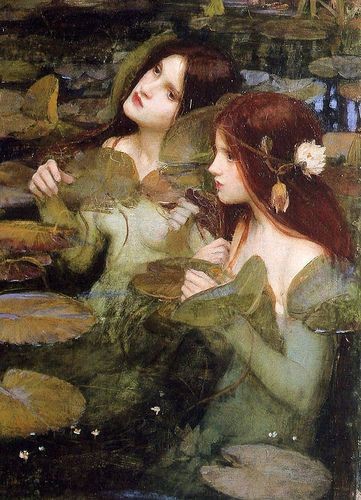
#water element#earth element#john william waterhouse#painting#mermaids#naiads#sirens#bog#marsh#water magic#earth magic#swamp
11 notes
·
View notes
Text
if anyone is curious, i originally got the idea for my giyuu fic from the story of Hylas and the Nymphs from Greek mythology!
Hylas was a companion of Heracles and was essentially kidnapped by the naiads when he went to go fetch some water for his group.
they basically found him so beautiful that they decided to keep him😭 (and ofc Giyuu will be our Hylas in this scenario lol)
#[ 👻 ] - ghost speaks#ofc i will be going into more detail as to what happened to him#compared to the actual legend#and will be taking...creative liberties#but then again#the greeks fucked like rabbits anyways so#cw: kidnapping
2 notes
·
View notes
Text
That ask earlier reminded me of how much i love paintings of the Fae
One of my favourites is Hylas and the Nymphs, an 1896 oil painting by John William Waterhouse

I saw it at someone's house once and it just captivated me, the way the nymphs are drawing Hylas towards the water, where they'll likely drown him, and he is so entranced that he doesn't realise what theyre going to do to him. Thats my interpretation of it at least, other people might think something different.
Every time i look at this painting im just as entranced and unable to look away as Hylas.
18 notes
·
View notes
Text
thinking about how as a teen i used to masturbate thinking about that painting hylas and the water nymphs i wonder if i could recreate the fantasy by having my butch fuck me while holding me underwater in the bath
#would obviously require some care to make sure i didn’t just . well. drown. unlesssss…. 😳😳😳#what on earth to tag this lol#death////////#??
3 notes
·
View notes